#which influenced what her traits were!
Explore tagged Tumblr posts
Text

Trollsona!! Her music genre is Electro-Swing bc it’s my favorite genre to listen to :D
I had a lot of fun trying to combine the traits of a funk and a techno troll
And here’s the song that was in my head while I was drawing :]
youtube
#ignore the spelling mistake i misremembered#trolls#dreamworks trolls#trollsona#trolls oc#electro swing#side note i LOOOOVE how the techno trolls look#a tier design right there#meraki art#the charleston#the notes in the top right is what the wiki says abt electro swing#which influenced what her traits were!
25 notes
·
View notes
Text
edit : i'm sorry but this post is messy i don't like how this is the ramble that got the most attention shhffs please check out the addendum in the reblogs if you want a more clearer analysis
-
FIRST OF ALL the thing about the paint huffing - Other than that it's funny - is that we were getting ragatha at her most honest . she's more reflective and reveals her mind more which is a Lot considering that she has shown herself to be a people pleaser trying to avoid conflict . this is Literally The Last thing she wants


and honestly it would be fun to see the fallout of this in episode 5 when she would inevitably sober up and be Mortified about that fact considering she said This to gangle here
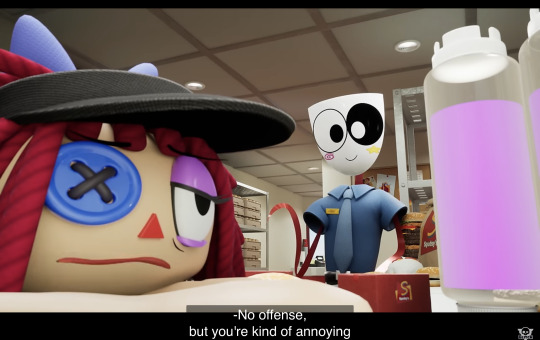

like . interesting ragatha . is that why you Do Not Stop Jax when he goes to bully gangle . other than not wanting him to hate you you also prefer it if gangle is in her tragedy state . is that it . Is That It -
also you guys don't know how much i fucking screamed at these scenes okay . there's nothing i love more than nice characters that show their less than desirable traits . my favorite thing about ragatha is not that she's a sweetheart but that she's Dishonest . even to the point that gangle mentions it in her talk with pomni
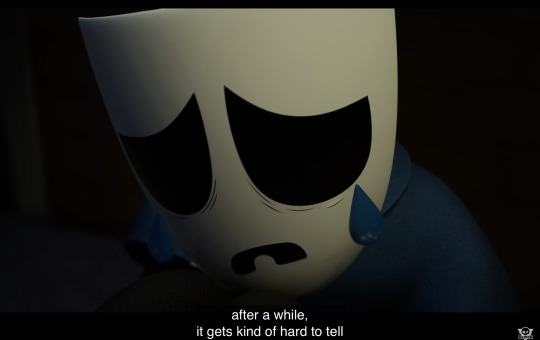
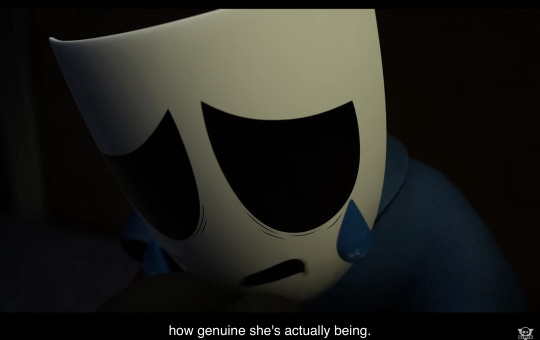
like my ongoing theory right now for the ' evil ragatha ' comment gooseworx made for episode 5 is that ragatha's going to say or do the Most Morally Ambiguous thing possible that will send the entire fandom on fire . like we're talking Arguments on whether she's in the right or wrong Even though this is a show that invites nuance instead of black and white views , and it'll be so fucking marvelous to witness
NOW . i really don't think she's faking being nice ! i believe with all my heart that ragatha's inherently Good and i will throw hands at anyone who thinks otherwise . it's just that she's just Repressing What She Thinks About The Others because , again , Avoiding Conflict ! which is shown by how annoyed she got with pomni talking to gummigoo ( gayass ) , what she said to gangle , and what she said to zooble
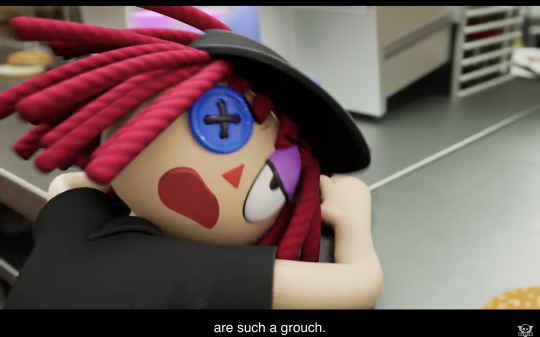

yes i screamed about the toybox interaction i knew that ragatha was going to not like zooble's grouchiness But I Digress .
all of this is interesting because . again , ragatha's a people pleaser trying to avoid conflict . i think her reasons for being nice and helpful are both selfless and selfish . selfless - she doesn't want anyone to go through the stress and pain of feeling alone , and selfish - she doesn't want anyone to hate her . they're like a smoothie , she's not one or the other . it's just that the latter reason ... has a lot more influences on her thought processes than she'd like to admit .
and that's showcased if you look at episode 2 with her conversation with kinger . she was worried about pomni going through something traumatizing , yes , but she added that she thinks pomni doesn't like her that much . which . it's a small piece of dialogue but it really shows how much ragatha's Gripping That Fucking Fawn Response . yes , her concern is everyone's wellbeing , but she also Would Not Like It If Anyone Hates Her , to the point that it'll stick to her . and she'll try So Hard to compensate for it .
like . she is really a nice person but she's dishonest because she doesn't want to be hated which is very much a selfish reason . she's falling into that pitfall of ' a friend to all is a friend to none ' . argh . why is she so complicated god i'm going to put her in that deepfryer again
7K notes
·
View notes
Text
Why The Arcane S2 Finale Fumbled, Part I
arcane season 2 was artistically beautiful and thematically cheap. every interesting and meaningful thing it did with its characters (even in season 2 act 2) was reduced to romanticized bullshit, utterly divorced from its season 1 roots. it's so bad it can be considered pro-status quo propaganda (and i do mean that). good ships aside (and i do mean the caitivi, jayvik, timebomb holy triad), this season squats and shits on every zaunite character in the show. not just their zaunite-ness, but how it literally shaped who they were as characters.
Let's start with Vi:
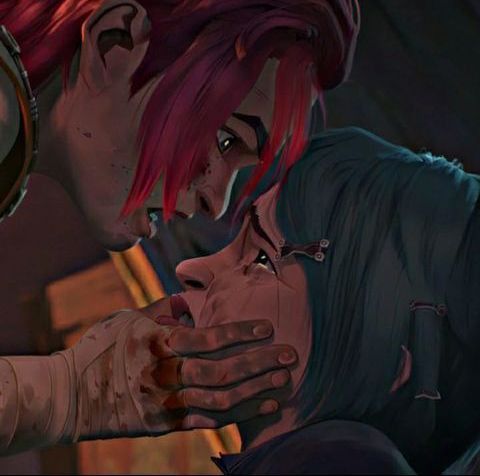
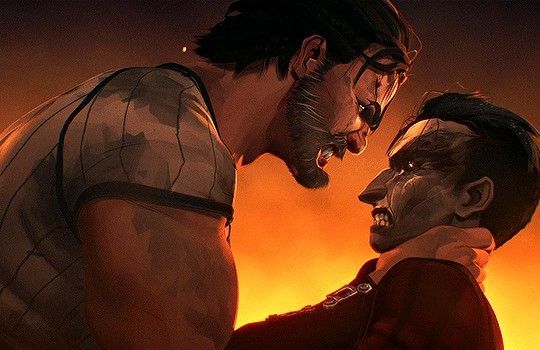
Vi and Vander:
Vi's loyalty to The Lanes always went beyond Powder. Zaun was her father's, Vander's dream. Zaun was her friends and her family. When she's giving Caitlyn a tour of The Lanes, we see how much she embodies and revels in Zaunite culture (esp in the food scene). She took responsibility for the vulnerable, like Vander taught her to. Her "protective" trait extended to ALL the vulnerable in The Lanes, because Vander taught her that. It wasn't EVER just Powder. Zaun is her HOME. As a child, she wanted to make a name for herself IN ZAUN "one day, this city's gonna respect us." You can make the excuse that Vander's death meant that side of her died, but it clearly didn't because of how she regarded it while showing Caitlyn around. "Family" to Vander, extended to the vulnerable of Zaun, which is how Vi and Powder came to be his "daughters" in the first place. Because Zaun was for THEM. Zaun WAS THEM. Vander and Silco "weren't allowed to fail" at Zaun (i.e. the two daughters).
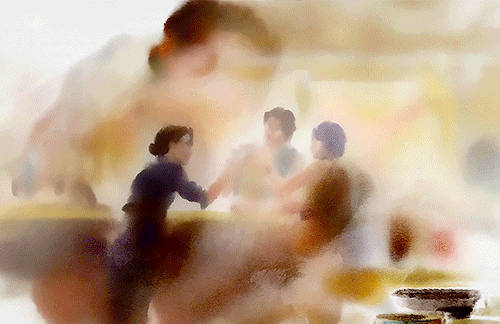
Additionally, Vi and Jinx were supposed to succeed where Vander and Silco hadn't: forgiving each other and uniting so they could realize their dream for a free Zaun. A big reason why Zaun struggles to be free is because of their own internal divisions (the different gangs fighting for scraps). But if they united, they would be able to liberate themselves from Piltover (who is still the enemy). The whole reason the others are prosperous in the alternate timeline Ekko and Heimerdinger travel to is because Vander and Silco reconcile (not because Vi dies).
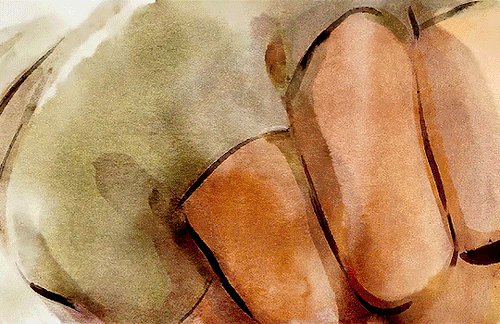
Vander also passes on his sense of responsibility to Vi. He tells a repeatedly vengeful Vi how her ambition to show up her oppressors can overshadow the more pressing priority of looking after those more vulnerable than her i.e. Powder. Like Silco, his advice to his daughter is steeped in his own trauma of getting so zealous he didn’t stop to think what it would cost.
Vi and Caitlyn:

Caitlyn was an interesting development for Vi, particularly because Caitlyn mirrored Vander's care for all people. Caitlyn was an enforcer that wanted to truly understand and help people. This challenged Vi's biases and also gave them a common goal. Caitlyn appealed to Vi because she gave Vi renewed hope for peace in The Lanes. That Zaun could be free through co-operation instead of violence. Her whole teaming up with Caitlyn, romance aside, was predicated on Vi brokering for peace between Zaun and Piltover (and getting revenge on Silco).
The first break-up between the two (Season 1's "Oil and Water") centred around Jinx, more or less. Vi believes Silco is a threat to peace between Piltover and Zaun (even though The Lanes aren't known as Zaun to her, I'm just using the names interchangeably). She believes Jinx is acting out due to Silco's influence, as well (and she isn't wrong). Had Caitlyn not been injured on the bridge (and had Jinx not felt betrayed by Vi), Vi was going to leave her in pursuit of Jinx. Vi has also never fit into Piltover (and that's also shown in Season 2 act 1-2). She makes no connections with Piltovians besides Cait and (an already disillusioned) Loris who we see for like two seconds.
Vi and Jinx:

This show was ALWAYS about a tale of two sisters/cities. When Vi becomes an enforcer, it isn't because she's switched loyalties. She wants peace for The Lanes, she just wants to take Silco's creation--Jinx--out of the equation so it can work. Her priority, like Vander’s, is to keep the vulnerable of The Lanes safe, and both were willing to co-operate with Piltover to protect the people they loved. She believes, like Vander did with Silco, that Jinx (and by extension Zaun) is her responsibility. That the reason bad things happened to Zaunites (Vi’s and Powder’s parents dead on the bridge, Jinx’s mania) is their fault.
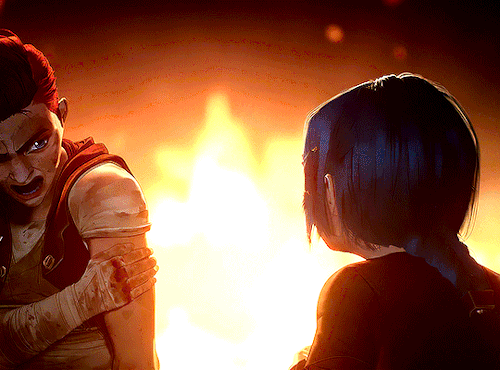
Vi blames herself for creating Jinx as Vander does for creating Silco. The only reason Vi agrees to Caitlyn's plan is because, again, their two goals align: get Jinx. The difference is Vi wants to kill Jinx to kill Silco, while Cait wants to kill Jinx to get her city (mother) back. Vi is still explicitly concerned about Jinx, who she has come to see as a threat to other people she loves (e.g. Ekko, Cait, etc). Vi became an enforcer to protect The Lanes and the (appearance) of peace. Vi internalized Vander’s words and doesn’t want war, even if it means Zaun never becomes independent. But she is doing it as penance for what she feels she didn’t do that led Jinx to become what she is.
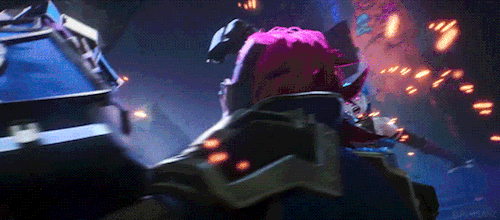
The show in season 2 TOTALLY LOST THIS FOCUS. Vi's guilt at hunting down her own people with enforcers is ALSO ignored a lot by fandom, especially because her post-breakup scene where she goes full goth is framed as regret for letting Cait down (rather than the self-disgust she would feel for joining her oppressors). Vi played a part in creating Jinx and her enforcer-arc is still centred around Jinx. This gets shoved aside for romance with Cait. All the time we could spend post-breakup focusing on the sisters, quickly circles back to Cait.
Cait, who, literally became a dictator and weaponized the air ducts her mother had created to SAVE ZAUNITES. The whole thing is viewed as Vi betraying Cait instead of Vi betraying Jinx/Zaun/her family and Cait betraying Vi ("promise me you won't change") and her mother. Cait was the one who sought to help Zaun (like her mother) but betrayed who she was when she was willing to kill Isha, an innocent child.
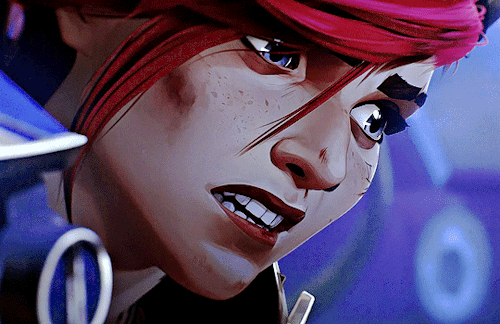
Vi would feel even more guilty at how she is literally in an enforcer's suit when she is about to kill Jinx, the only family she has left. She is literally hunting down Jinx, a Zaunite, like the enforcers had her parents. But we barely explore that. It’s just off to chasing Vander/Warwick only for it to not matter anyways!
(ALSO IMPORTANT: Just to further prove my point on how integral the sister's love for each other was, every show started with a record playing. The cover of the disc was Vi and Jinx. They were always the center focus of the story. The song that the record played? Likely "Our Love" by Curtis Harding and Jazmine Sullivan which goes "Our love is a bubblin' fountain, our love, that flows into the sea, our love, deeper than the ocean, our love for eternity." This love deeper-than-the-ocean can apparently crumble in the face of a dictator girlfriend you've known for less than a year lmao).
Summary of Fumbles:
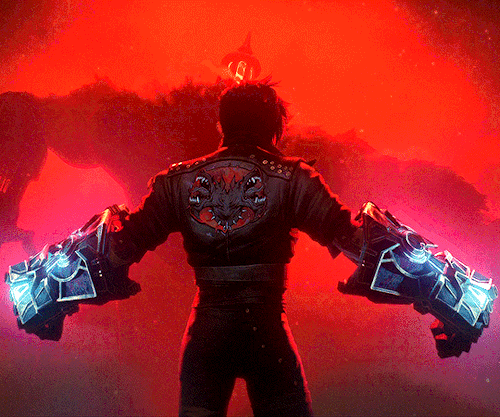
-Vi's and Jinx's relationship becomes secondary not just to the entire plot of the show but to Vi's arc. Zaun and Piltover's conflict was set up to be the epitome of the show, and the fact that it got shelved for some (ahem military propaganda) epic battle between humans and robots is very telling about the writers and showrunners.
-Vi forgives Cait easily and prematurely, trashing Vi's true loyalties as established in earlier seasons/episodes and robbing Cait’s actions of their appropriate weight.

-(above is an excerpt from Amanda Overton's interview with TheGamer) The culmination of love for Vi's character ends with Caitlyn and not Jinx. Vi's character, whose love is explicitly centred on Zaun and her family, reaches its peak in romance with a Piltovian. To quote Amanda further: "If Vi had no one left to protect, she would fall in love." As if Vi had no ambition outside of protecting her family. As if her dream since she was a kid wasn't tied so much into Zaun. As if the reason she wore an enforcer outfit wasn't because of Zaun. As if Zaunites aren't suffering right under her nose. As if she was the only kid in Stillwater Prison and struggled to survive the whole time she was there. I can't pretend to stomach it. (Again, it's not that Vi shouldn't be happy, it's that the ship had to shove this aspect of her character aside for it to work). If they wanted to really commit to the Vi-in-video game origin story, they should have set it up better and stuck to it.
-Vi herself takes a back seat in most of season 2, and becomes a passive, guilt-riddled yes-man to Cait
-Vander's re-introduction is almost completely worthless to the plot and narrative (he comes back just to die), and he is used as a cheap way to re-unite (and then separate) the daughters in a way that has no significance to the themes (also, Silco as Jinx's father is completely ignored during this time)
-Cait's deferral to fascism should have been permanent. Idc about the shippers at this point. Vi and Cait should have never come back from Cait shoving the back of her gun into Vi's injured side (let alone the gassing of the ducts). Vi would've never forgiven her, attraction or no. The fact that Cait could become a dictator after losing one parent is proof of their class divides (after all, Vi held onto hope despite losing all her parents to enforcers and Jinx was all she had left of her family). That should have cemented the death of that relationship (and it would have made for more compelling storytelling on class). I’m thinking it was kept because it matters more to white Western audiences to have a Romeo x Juliet rendition that assuages their classist sensitivities. Cait becoming a fascist made sense and was true to her character and the world. Vi forgiving her (and then having sex with her in the prison she was thrown into as a child?) destroyed both her character and the narrative.
Yeah, yeah, Vi was overwhelmed by the breadth of love and forgiveness Caitlyn had in letting Jinx go, but that's bare minimum shit. Vi "always choosing wrong" because she *checks notes* keeps trying to reconcile with her sister instead of letting her go since she isn't Powder anymore? So she resolves her guilt by choosing her own pleasure and putting herself first for once. Okay, I don't have a problem with that except that Vi and Jinx were supposed to succeed where Vander and Silco hadn't--by reconciling! And you still won't get me to like the fact that so much of Vi's character arc gets held up in a Piltovian who encouraged her to do the worst shit to her OWN PEOPLE and then fucking turned on her when she couldn't kill her sister. It is frankly amazing how we're supposed to celebrate Caitlyn literally coming between the sisters. I'd rather Vi forgiving Jinx than Caitlyn. And if the whole appeal of Vi's relationship with Caitlyn is that she was overwhelmed with love for how Caitlyn forgave Jinx after she killed her mother, I don't see how a relationship with Cait automatically makes Vi feel less guilty, since Cait also makes her feel guilty for choosing Jinx (remember her accusation "you will always choose her" like sorry I don't want to kill my orphaned, traumatized sister who I ripped into for making an honest mistake as a child and who has carried that since). Caitlyn (as others have pointed out) got a whole ceremony for her mother and instantly turned on Vi's people. The Vi I know would have been like, "You really are all the same," and FUCKING DIPPED. And there's a little acknowledgement of this in act 1 where Vi accuses Caitlyn of acting like Jinx.
Both Jinx and Caitlyn are emotional labour for Vi. Vi still wants to protect Caitlyn from Jinx. There's not that much of a difference, lol, except that Caitlyn is a privileged Piltovian and Jinx is a victim of the abysmal childhood she suffered at the hands of enforcers. Yet the show is more or less saying Vi pursuing reconciliation with Jinx was a bad choice for Vi and the reason the cycle of violence continued (for some reason). The sister reconciliation was what I was here for, personally. Cute ships aside. But noooo, Vi should forgive Cait (not Jinx) to stop the cycle.
And having jail sex is a liberating act for her because it's where they had their meet-cute. (And we're all good bc Caitlyn gave up the Kiramman seat, lmao, like sure okay).
It's frankly made the ship that much more unpalatable. If Vi had to be destroyed as a character for the ship to work, then the ship wasn't all that good (even though it started off that way). It's honestly left such a bad taste in my mouth. What a fuck you to oppressed groups that whole subplot was. (And it's made worse by the fact that the creator thought that was somehow an empowering and liberating act for Vi, like fuck that).
Let's Talk About Victor:
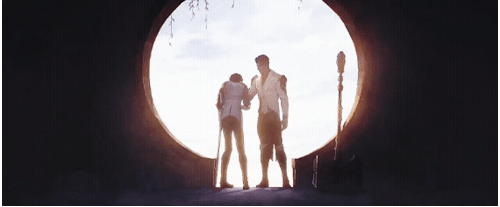
Viktor and Heimerdinger:
Heimerdinger and Viktor were the most polar of opposites. Heimerdinger was not only a privileged, ulta-wealthy Piltovian, but he had a comparatively endless lifespan while Viktor's own human life-span was cut short due to being a Zaunite, born at the bottom of the barrel and raised on toxic fumes that led to his terminal illness. Viktor's desperation to unlock the Arcane was explicitly about him overcoming his circumstances, his illness, his premature death. It wasn't merely about his internalized ableism, but the unjust way in which he had to suffer. Heimmerdinger could afford patience because he had all the time and resources in the world, but Viktor didn't. Not merely because he was a mortal, but because he was a Zaunite.
Viktor and Singed:
Viktor's arc with hextech is foreshadowed with his childhood interaction with Singed. I understand that in the games, Viktor is a villain-type character and his catchphrase or whatever is "Join the Glorious Evolution," which the show hinted at from Season 1 when Singed explained his experiments to Viktor. While Viktor is horrified by Singed killing the creature that he eventually uses for shimmer, Viktor later says, "I understand," hinting that he saw the sacrifice (and death) necessary to "heal" the world of its ailments. Both Viktor and Singed grow up in The Lanes, and both have ailments they want to cure (for Viktor it is his lung cancer and for Singed its his daughter's dying). In season 2, Viktor tells Singed that while he understands what healing all those people could cost him, he will not sacrifice their humanity for Singed's cause. This is because of Sky’s death (which is partly why it is her who is in the Arcane with him).

Sky’s death is what makes Viktor beg Jayce to destroy the hex core, since he couldn’t do it himself. He is willing to die if that means no more innocent people do. But here’s where I get a little touchy. VIKTOR didn’t KNOW she was there. Viktor was simply desperate to live. Sky’s death was not malicious (even if it’s true to his character that he’d feel guilty anyways). It is at this point that Viktor has Jayce promise him to destroy the hex core (and by god is this where a lot of my contention with the finale comes from). Also, it is important to note that Viktor’s self-loathing is depicted only in regard to Sky’s death (NOT HIS BAD LEG). Now Viktor feels guilty not just for Sky’s death, but also necessarily for trying to live (AND PLEASE KEEP THIS IN MIND). TRYING TO LIVE is subtly treated as an AMBITION that, for Viktor, interfered with his ethics. (And please note that in the end, Singed, who repeatedly embraces unethical practices for reviving his dying daughter gets what he wants).
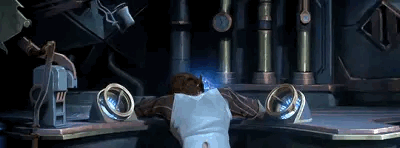
Anyway, in S2, Jayce blasts Viktor in the chest and all that conviction goes out the window. All this despite Sky (his conscience and “humanity”) being there with him in the astro-nether. Now Viktor's idea of becoming a higher being is just getting rid of emotion (apparently because Jayce did it or something). Jayce killing him without explanation was all of a sudden all he needed to become a divine dictator. The same Viktor that looked terminal illness in the face and preferred to spare others instead of himself? The same Viktor who's immediate action after waking up with a new body was to go and use the arcane he wished had been destroyed to help others? Because the arcane is corrupting him? That’s convenient for a certain political narrative. Especially because anyone would hesitate pressing a button (in Viktor’s case smashing the hex core) that would guarantee their death. Viktor was being human, not corrupt.
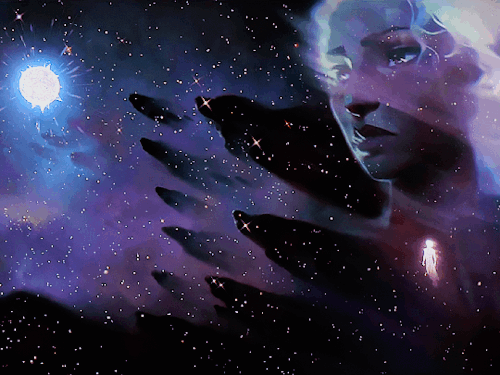
Viktor and Jayce:
Now, I think Jayce's speech had some merit and could have been framed better with a little more time and thought. The philosophical idea of perfection or a perfect world (one which Piltoverians strive toward) being untenable, maybe even undesirable, is a fascinating concept worth exploring. BUT MAKING IT ABOUT SOME INTERNALIZED ABLEISM FROM VIKTOR IS FUCKING STUPID!!!! I'm sorry, but Piltover being the city of progress until it actually included becoming progressive with Zaun was absolutely one of the things Jayce and Viktor's sub-plot was trying to explore.
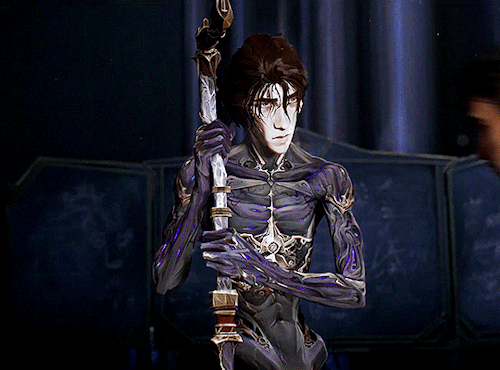
Viktor WANTED TO LIVE. Viktor wanted his people to STOP SUFFERING. Viktor WAS RIGHT. He wasn't merely eliminating "imperfections" (and of FUCKING COURSE A PILTOVIAN WOULD SEE IT THAT WAY), he was trying to cure sick and dying people who did nothing to deserve it. He was buying them time that people like Jayce and Heimmerdinger had in spades, but Viktor and Zaunites had stolen from them.
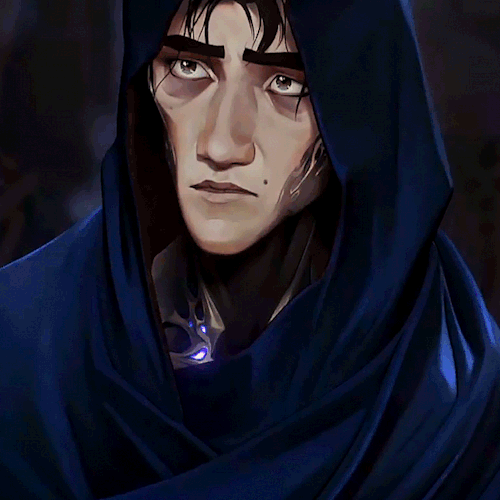
Children dying of disease and violence in The Lanes was by Piltovian design! It was not some predestined cosmic necessity. Viktor WAS RIGHT TO HATE HIS FUCKING TERMINAL ILLNESS ARE THESE GUYS INSANE??! Wtf kind of message is Viktor embracing it as part of himself sending to vulnerable, impoverished and ill people? Is that supposed to be some kind of fucking comfort? Fuck off right to hell!
Like I'm glad if it resonated with any disabled people, but Viktor's struggle with his body was a protest against Piltover, not himself, and I hate that the writers gutted that character development. Viktor's and Jayce's paths "diverged a long time ago" because Jayce had the luxury and time of pursuing his dream while Viktor didn't. Viktor, even up there as a scholar of Piltover, was still getting the Zaunite treatment.
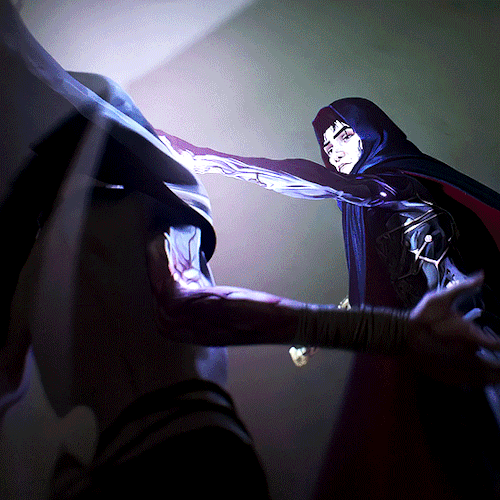
Jayce had the time to pursue a better world, while Viktor had to struggle for a little more time. When Viktor becomes part of the arcane, suddenly he has all the time in the world to realize HIS OWN DREAM. Why would wanting a better world for others have to result in "dreamless solitude"? Why does wanting progress equal wanting perfection? You are changing the subject and that is cheating!!!!
Viktor becoming obsessed with fixing what ailed humanity was warranted, and his extremism was hinted to have been due in part to the effect the arcane had on him, but it still made the themes of arcane a joke. There was so much potential and the writers (and showrunners) just squandered it for some more romantic bullshit.
The Glorious Fumblings (A Summary):
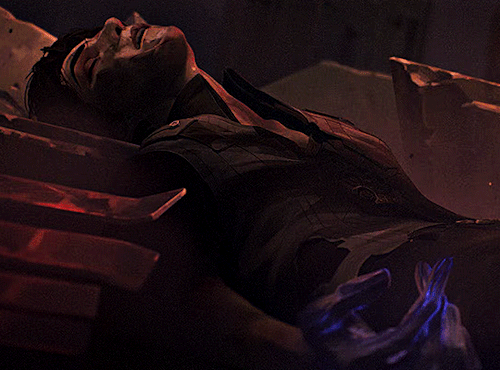
-"Humanity, our very essence, is inescapable. Our emotions, rage, compassion, hate. Two sides of the same coin, intractably bound. That which inspires us to our greatest good is also the cause of our greatest evil.” That's a neat quote, but wars don't start simply due to emotions or whatever. This lacks class analysis, and it's annoying that the writers made this the whole theme of season 2 (and retroactively the show) in a story on class divides. Cait did not merely gas the Zaunites because of her mother, but because of her privileged upbringing that made it more acceptable to her to view Zaunites as animals (remember Ekko telling her enforcers “hunt us down like animals"). Cait knew the humanity of Zaunites was real. She just chose to ignore it because she could afford to. While it is interesting that Viktor would come to see being human as a flaw that destroys any hope of achieving peace (conflict theory would like a word with you), it ignored that fascism is not an inherently human trait and detracts from how or why it persists in the first place. It's almost the same as saying men/white people oppress women/poc because the latter were mean to them. It's victim-blaming (and false lmao). The British didn't colonize the Americans because the natives did anything to them. All prejudice is unjustified, that's what makes it prejudice. Again, Cait became a fascist when her mom died, but Vi still drew the line at killing children and even council members despite losing every single one of her family members to Piltover's violence against The Lanes. AND THAT’S JUST IT. Why the Zaunites do what they do isn’t simply because of love and hate, but because of the desperate circumstances they are forced into by their oppressors. Why the Piltovians do what they do, isn’t because of love or hate, but because they are bread in luxury and affluence. Pretending that’s not the case is an insult to the work put into Arcane’s first season (and anyone with a brain and basic empathy).
-Jayce's speech would have been cute in another story, but it's downright insulting in Arcane's. Yes, yes, Jayce's words would have been the only ones to have broken the real Viktor out of Arcane Viktor's grasp by appealing to this deep childhood wound, but Viktor's desperation was not to belong (because his leg kept him from playing with other children) but TO LIVE (because he was dying of an illness). Jayce's speech isn't bad, just misplaced. Like most of the finale.
-Viktor did not have to become a fascist-aligned deity in his quest to heal people. It is a typical MCU thing to have a "villain" that's technically right and then destroy their entire character to make their (correct) philosophy untenable by making them do something extreme. Typical pro-status quo propaganda trope. I DON’T CARE if it was so we could get some game version of him. Viktor was right in bringing progress and his discoveries to The Lanes instead of devoting his efforts to Piltover, the fake city of progress.
-While I am annoyed that the climax of the show hinged on Jayce and Viktor and hextech (a tool to explore the inequalities of Piltover and Zaun) instead of Jinx and Vi, I think it kinda makes sense. Hextech built what Piltover has now become. Jayce, Viktor and hextech kinda represent Piltover (what it could be) and Jinx and Vi represent The Lanes (and the Zaun it could be). Both would have been integral, but the story shouldn't have hinged on hextech, IMO. Hextech should have remained a tool to explore the politics of both cities, but instead it overshadowed everything, cheapening the story's themes, characters and world-building.
-Jayce calling the Zaunites to arms was downright absurd. But not as absurd as Zaunites volunteering.
And Then There's Jinx:

Jinx and Isha:
Isha's only use, as far as I'm concerned, was to be a reconciling force between the sisters. When Cait was willing to shoot her to get to Jinx, that should have stopped Vi right there and brought her back to defending Jinx 100% I DON’T CARE. When Isha sacrificed her life to save Jinx, that should have been Jinx's wake-up call right there and helped her understand why Vi kept leaving her out of missions as a kid. But instead what do we get? Depressed, suicidal Jinx and an astoundingly even more resentful and indifferent Vi. Now Jinx sees herself as even more of a poison to those she loves (because she can’t protect them like Vi can and frequently kills them while trying to do so). Jinx, who has always wanted to be useful to those she loves. Who pursued her own hextech inventions in order to give her siblings a fighting chance when facing down Silco. Who wants to give Zaun a fighting chance as Silco's daughter (and Isha’s surrogate mother). To be useful to the goals and dreams of her family. Isha was the perfect opportunity to bring the sisters together and get Jinx to embrace all she is (both the Jinx that Vi rejects and the Powder that Silco rejected), but no. Instead, the kid was some kind of foreshadowing to Jinx's own heroic self-sacrifice for her sister (a message that left both sister's arcs unfinished). Or perhaps, Isha was a commentary on the cycle of violence. But that this sub-plot really wasn't needed given what we'd already established in Season 1.
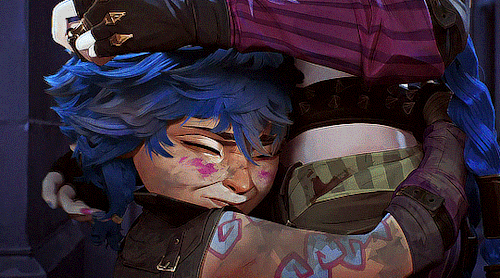
Why do I say this?
Because the cycle of violence is not a "Jinx" issue, but a Piltover one, and the writers making it an interpersonal issue instead of a political/sociological one damaged the story and what Jinx's character could have meant to mentally ill people like her. It wasn't illogical storytelling, just far less meaningful than it could have been. It would have been more powerful and moving and impactful for Jinx to realize where the true cycle of violence (as established the whole fucking show from the dead parents on the bridge, to Vander and Silco, to Jinx and Vi, to Jinx and Ekko, to Isha and Warwick, to Cait and Vi, etc) was coming from.
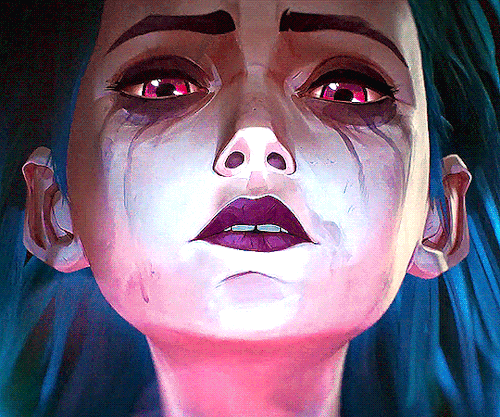
Jinx needed to accept herself and the love others showed toward her (Silco, Vander, Ekko and Vi). Jinx keeps blowing things up because she repeatedly rejects herself (both Powder and Jinx), ignoring the good she's done and tried to do. Isha was a call back to the good Jinx has done and can continue to do for Zaun and others. Isha and Sevika understood (even though Silco unfairly set it up) that Jinx was actually their good luck, their hope, more than just a hex (pun intended) on the city. After all, Jinx made Sevika her new arm (even though she's the reason Sevika lost her arm in the first place), which further proves that Jinx had the capacity to fix some of what she broke. It would have been better for her to embrace responsibility and have the faith to try and fix things (ESP her relationship with Vi). While it is not unrealistic or necessarily bad writing that she would fake her own death to run away and start over (or just die) trying to save Vi, the arc people she represented deserved was her embracing Vi back, not accepting that she was a curse in Vi's life. And most definitely NOT romanticizing her pain.
Jinx and Ekko:
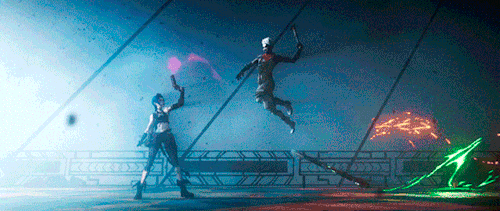
Ekko's and Jinx's relationship is precisely an exploration of how Piltover's violence against Zaun forced these children with entire futures ahead of them (they are both child prodigies) into endless war and hellish heroism. Ekko and Jinx are repeatedly shown to be hesitant and even unwilling to participate in violence against others, especially their own. Ekko does not hate Jinx, though he wants to, and Jinx does not like who she is when she's violent. She is trigger-happy because she already expects Vi and Ekko to want to kill her (projecting her self-loathing on them, but not entirely unreasonably). She doesn't have faith in their love or mercy because she doesn't see any part of herself as redeemable or loveable, which is why she consistently sabotages her life (but not without help from Vi and others).

Ekko and Jinx are symbols of progress for Zaun AND Piltover (and Heimerdinger saw that, especially when Ekko insisted he had to go back to his timeline, even if the one he had landed in was better). Heimmerdinger saw what they could have been in the alternate timeline, all the genius that was squandered in The Lanes. Jinx and Ekko are the ones most willing to put an end to violence and injustice because both of them are nostalgic for their families. All that’s ever kept them going is the love of their families. Jinx just doesn't have the same faith in her ability to be their hero as Ekko does, but Ekko manages to convince her for a moment anyways.
Ekko recognizes (like Silco, Viktor and Isha) how integral Jinx is to the creation of a new world. She injects colour and life and hope into Zaun and is the only one who can unite all warring factions in Zaun in the first place. I know people have gripes with this Jinx being the hero of Zaun when she literally killed Silco, opening the market for other gangs, but her most famous act is the bombing of the Council, which pretty much all Zaunites were unaware was about to grant them independence. To the average citizen of Zaun and Piltover, Jinx was the symbol of a revolution (even if Jinx didn’t see herself that way and didn’t really want to be). Both her and Ekko are rebel leaders, but that is hardly used in Zaun's interests in the end. (ALSO THAT WHOLE CONVERSATION WITH VIKTOR AND JINX WHERE HE SAID SHE COULD BE USEFUL TO HIS WORK. This show would have won with a Viktor and Jinx team-up to unite Zaun--also in parallel to Jayce and Vi's team up. We could have had it all!)
Jinx and Silco:
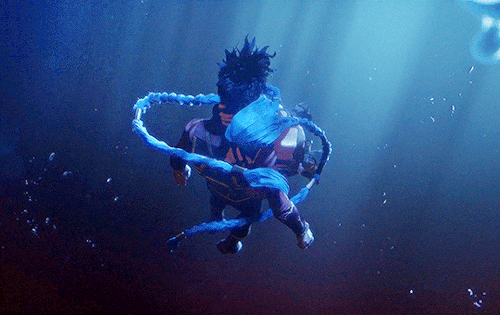
This, is only second to Vi in the most FUMBLED things about Jinx. Silco was her guide once Vander died and Vi ran away. Silco not only took care of her, but gave her purpose (someone to love and be loved by and protect) and nurtured her talent (one that many others scorned). Silco accepted Jinx even though he weaponized her (which backfired for him). As much as Silco WAS WRONG to lie about Vi (manipulating Jinx) and even try to kill Vi (which was a dumbass move on his part), he wasn't wrong about Jinx's path to healing: self-acceptance and self-forgiveness. And even though Silco's own stupidity led Jinx to "embrace" Silco's version of Jinx to the point that she bombed the Council right when they'd granted Zaun independence (I wanted to fucking kill myself watching that), Jinx was still not ENTIRELY a jinx as Jinx (e.g. when she rescued Zaunites from Stillwater Prison). This fucked up dude did a whole John-the-Baptist thing where Vander tried to drown him with Jinx so she could embrace her Jinx-ness. But I don't think he was telling her to embrace that she was a curse like Vi meant it, but to embrace her new life (baptism is all about death and rebirth) and her new self and take responsibility for it.
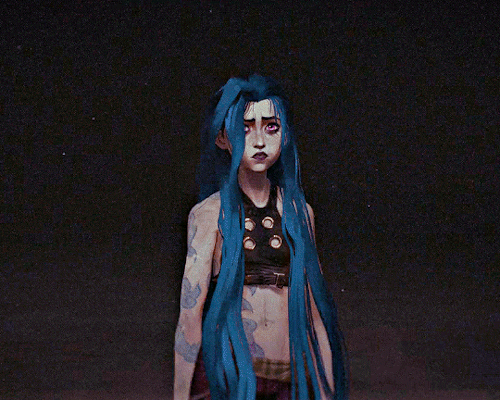
Silco, like Ekko, was the one who saved Jinx from death and offered Jinx a home. While everyone else patronized Jinx for her own childhood trauma, Silco was gentle, understanding and provided space for that, even when her psychosis killed him. He showed zero resentment toward her. But when Silco dies and Vander returns, Jinx just . . . oopsie, doopsie! Forgets about Silco until one final hallucination she has of him in the jail cell. The only one she has where he talks. And what does he say? She needs to break the cycle. How? Not by eliminating Piltover or gaining Zaun's independence like he'd talked about and dreamed about. Not by accepting herself as Jinx and Powder, the inventor, the fighter, daughter of both Silco and Vander, but by offing herself? Leaving her family to think she's dead? Embracing the lie that she really was the poison in their lives and the reason none of them could be happy? The reason they died? NICE! SWELL! WHAT A SATISFYING, INSPIRING CONCLUSION! Even worse, they made her "death" staged. I'm sorry, but do we really believe that this same girl who killed herself multiple times in front of Ekko just 24 hours ago somehow found the will to live and escape into air ducts when she was falling with Vander? She decided to live right when she was about to die? And let's not forget that she was falling to the same song that was playing when she was trying to commit suicide. Why? And why would a heroic death (staged or not) be any form of character growth for Jinx in the first place? When her whole thing is distrusting the love offered to her? Or was she accepting herself by being the one to kill Vander because she knew Vi couldn't? Either way, it's cheap!
I Wonder Who Put All Those Holes In You (Fumbling Summary):
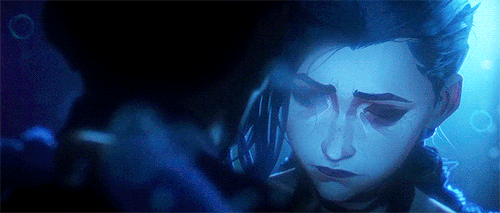
-Vander's letter to Silco could have been why she hallucinated Silco talking to her about forgiveness, but breaking the cycle here is about forgiving (unapologetic) Piltovians instead of herself, which needed to happen to complete her arc.
-Isha and Vander misery porn


-(above is an excerpt from Amanda Overton's TheGamer interview) to paraphrase: "SO OUR GRAND CONCLUSION TO VI AND JINX'S ARC WAS TO CONFIRM THAT YES, JINX WAS INDEED A JINX (AND NOT PILTOVER OR ANYTHING HAHA) AND THE SISTERS WOULD ONLY HAVE PEACE IF THEY NEVER RECONCILED - JUST LIKE THEIR FATHERS BECAUSE THAT WORKED OUT SO WELL THE FIRST TIME! :D THE REASON THEIR LIVES ARE IN SHAMBLES ARE PURELY BECAUSE OF THEIR OWN PERSONAL FAILINGS AND NOT AT ALL BECAUSE OF THE SITUATION PILTOVIANS HAVE PUT ZAUNITES IN! XD WE THINK THIS IS ALSO A FANTASTIC THING TO TELL MENTALLY ILL PEOPLE." :)
-Jinx being the reluctant Girl Saviour of Zaun after clinging onto her identity as a jinx so she didn't have to take responsibility for Zaun should have been the completion of her arc, IMO. As far as Jinx's arc is concerned, she was meant to reject the identity of jinx that Vi gave her and embrace the identity of Jinx that Zaun gave her. Loveable and capable of doing the right thing and saving others. Using hex-tech, something Jayce and Piltover had levelled against her people, against them. And she does this to some extent, but we don't even get a hint as to why Ekko's speech worked (and how he got her to fight alongside him and the Firelights in the first place). We know she does so for Vi, but she so quickly gives up once she and her sister are back on the same team. She allies herself with her sister just to die and then fuck off to another land? BRUH! Like act 3 is SO FRUSTRATING!
Conclusion
If the focus had been on the coming war between Zaun and Piltover, then we could have better explored the internal struggles happening with Vi's and Jinx's characters. Using Isha and Vander as misery porn for Jinx was a bad move. I stand by that. Isha didn't need to die that uselessly. Jinx did not need more "trauma" for any character development (positive or negative). It's not unrealistic that Jinx would be depressed after Isha's death (and that Isha was likely meant to symbolize the constant cycle of violence), but that this sub-plot really wasn't needed given what we'd already established in Season 1.
These are where my gripes with Jinx's and Viktor's arcs in S2 really lie: the story tries to strip the political from the personal! Viktor, on waking up with the arcane in him, goes back to The Lanes, and what does he see? The cycle that Silco mentions in Jinx's hallucination in the cell. This cycle is not merely coming from the interpersonal struggle Zaunites have, but rather, the forces behind those struggles: the starvation, the lack of resources, the poverty. All caused by Piltover. Where Season 2 fails while Season 1 succeeded, is it points the camera away from Piltover as the origin of all this mess, and instead, makes it a stupid cosmic clash between chaos and order (kinda fascist ngl). Zaun lost, and Arcane Season 1 had the tits to show why those in The Lanes were always on a losing streak: Piltover. The commitment to saving Piltover instead of destroying it ruined so many arcs, most notoriously Vi's and Jinx's. This should have ended in a war between the two cities, not one where both fought against robo-people and Ambessa.
But what, instead, do the writers brandish as this solution to the cycle?
Fucking forgiveness (of those who harm and oppress you) and acceptance of your (physical) imperfections (like that's what we were apparently talking about, which no, it wasn't). By refusing to acknowledge Piltover's hand in the desperation and violence and struggle the Zaunite characters find themselves, the show inadvertently ends up excusing Piltover.
TLDR: Bad message to send to oppressed people, mentally ill people, and people dying of terminal illnesses, lmao. The Zaunites ALL LOST with this one.
And I'm going to make a Part 2 to really get into it, but from the perspective of three Piltover characters (and one Zaunite) that really prove my point: Jayce, Mel, Caitlyn and Ekko.

P.S.: It's okay if you think the show is good because it succeeds in many other things, I just think it drops the ball in the places I've mentioned. But if your main criticism of my criticisms is going to be defending your ships, please find another post. Oppression is a serious reality that deserves serious depiction and it's insulting to have such necessary political discussions devolve into dumbass ship wars.
EDIT: I honestly did not expect this post to get more than 20 likes lmao, and i must admit that this was more of a thought dump than a super-deep analysis, but i'm glad a lot of it has resonated with so many of you!
EDIT AGAIN: Here's PART 2.
#zaun#arcane#arcane season 2#jayvik#timebomb#ekkojinx#caitlyn kiramman#vi#vander#silco#jinx#ekko#isha arcane#jinx and isha#caitvi
3K notes
·
View notes
Text

Gilly, Ygritte, and Monster in Winterfell
art by @shebsart, commissioned by me
Shebsart came through once again guys!!! I’m so excited ^_^
For about a year and a half, since I got into ASOIAF, I have admired Shebsart’s work. Their Theon in particular is the closest I’ve ever found to my vision of him, I adore his hooked nose (Asha’s too!). They also have such an amazing Barbrey design and the Starks, including Jon, are amazing. I have paid for some Ygritte commissions before with other artists, and I have liked all three of them, but when it comes to the closest look of what I think of when I imagine her book counterpart is some of Shebsart’s old pieces of her (and Jon). I was looking for someone to draw Gilly and Ygritte and there was nobody whose opinion that I held in higher regard than Shebsart, as they were my favorite ASOIAF artist, so I asked them if they had any recommendations of who had their commissions open. They told me they actually considering opening their commissions and I have been working with them ever since, even though as far as I know they have not formally opened commissions. Shebsart has been really great to work with and patient, even though there’s been some trouble with payment barriers since we live in very different parts of the world. They’ve been professional and worked hard.
I have long imagined the possibility of Gilly and Ygritte as friends; I thought it was high time I got it depicted in some way. I think it would really benefit Gilly if she had some female influences that weren’t family members. Of course, she does receive this to some extent, but I think it would be very interesting for her to find companionship with a girl around her age that shared the general Freefolk culture, although of course her upbringing was wildly different than Ygritte’s. We know that Ygritte has some sort of soft spot for young children, or at least some sort of moral code that keeps her from killing them. This is one trait shown in both the books and the show. In the show, while I don’t consider anything that happened to it as canon, she specifically spared Gilly and Monster knowing that the others around her would not. I don’t think it would be much of a stretch that Ygritte would grow attached to Monster and have a soft spot there, even though we know she hates incest and would therefore consider his conception an abomination. Everyone in ASOIAF is misogynistic to some extent and some of the things Ygritte says about women are toxic, but I would like to think she wouldn’t victim blame Gilly or call her a whore as Stannis did. I definitely see Ygritte as a strong woman who would want to protect and stand up for someone like Gilly. And Gilly has great compassion and is all around a good person, so I think a friendship would be good for the both of them.
In the depiction above, Ygritte is Queen in the North, consort to Jon. This fits in the same AU as my previous Jon and Ygritte commission by shripscapi. I’ve said this many times, I respect people who hate Jon x Ygritte and they have very valid reasons, but knowing Jon’s character, as long as Ygritte lives, which she would have in this AU as the Battle of Castle Black does not happen, there’s no other choice in Jon’s mind for consort for him as King Beyond the Wall. For the timeline of this art, Jon was first crowned King Beyond the Wall and he went South with his people to get away from and prepare to battle the Others, seeking help from other rulers. His men battle the Boltons and because neither Rickon or Bran have been found yet, he is declared King in the North as well for the time being. His residence is temporarily taken up in Winterfell and the Freefolk settle nearby in close quarters. Jon goes towards the Vale as he’s heard word about Sansa, but Ygritte stays behind with some of the Freefolk. This is when Gilly is her lady-in-waiting. I wanted to show that Ygritte’s clothes are nicer than Gilly’s, but I still wanted both outfits to be respectable. I wanted the fashion to be reasonable for a Northern climate, so that meant furs. Besides, they are both Freefolk and furs mean a lot to them culturally. I sent references for clothing and Shebsart went from there. Some people say Ygritte would never wear a dress but I disagree if it was comfortable enough and she was able to boss people around and be smug, I think she’d wear it as long as it was advantageous for her. And besides, I imagine that Jon designed the dress herself and that’s flattering enough for her to like it. What I did like to show is that Gilly is taking more towards traditional “ladylike” activities like embroidery, while Ygritte isn’t interested. She’d rather sit around and talk and laugh.
Oh, and isn’t baby Monster precious????
Edit: I’ve seen someone say they think Ygritte would hate her life if this is what it was like, and I’m not mad at it or anything, but I don’t agree!!! To clarify more about this AU, Jon becomes King Beyond the Wall because the Freefolk believe that only someone with Stark blood would be able to negotiate with the Others, so they’d be doomed without him. So therefore it’s not just about her feelings for Jon, she’s married to the person she believes will be able to save her people. The influence she has on him is also major and a source of pride for her. In the art above, she is living in Winterfell and yes she’s wearing a dress, but that isn’t her life forever. The reason she stays and doesn’t go with Jon to the Vale is not because she’s a woman and he refuses to let her fight, but because in the main timeline she has a child already (this art has a bit of a fudged timeline, if I were to write a fic on this idea she’d already have had a child before they breached the Wall) and if Jon were to die, the child still has Stark blood and would still be the only hope against the Others. If she had been South and had died with Jon (Jon doesn’t die at this point, but the prospect is why she stays behind), the child would have a regent with their own motivations and wouldn’t have its interests at heart like Ygritte would. This is an important role that I do think at the end of the day, despite Ygritte not being the smartest person, she would take pride and be protective over. It’s not simply that motherhood has changed her and is a role that took over her previous personality, because that’s not true. It’s that there are greater things at play and she’s a key part of protecting the source of the realm’s salvation, so to say. She doesn’t live at Winterfell forever and when at Winterfell, she does boss around some Lords but doesn’t do any chores that she would find tedious. The most she does is sew together a wolf plushie for her child, which was incredibly poorly done. When Bran and Rickon are eventually found and thus Jon doesn’t have the title of Winterfell, they settle in lands previously ruled by the Umbers and she doesn’t wear a dress anymore, I have another commission by shripscapi that shows her usual attire but it is furs, she does hunt, she teaches her children to hunt and falconry. Her traditions are not stomped out in favor of Southron traditions. Her home is not a castle, but a small home slightly more impressive than the huts of the rest of her people, inspired by architecture during the Norman invasion. All in all, she’s really happy. The most important thing to her is that her people are safe, the Others are going to be defeated, and they’ve gotten past the Wall, a goal of her people for a long time. I guess I’ve just had a different view of Ygritte and the Freefolk than majority opinion. I think the Freefolk are more adaptable than people in the South generally are, and it’s impressive how they rallied together despite their differences when faced with the Others. I don’t think the Seven Kingdoms would be able to do that. So I feel as if she, as well as most of her people, would be very happy and feel a sense of accomplishment for being able to live on and live among people that, before the threat of the Others, would never be able to tolerate them and vice versa.
#asoiaf#a song of ice and fire#game of thrones#ygritte#gilly#monster#valyrianscrolls#fanart#asoiaf meta
644 notes
·
View notes
Text
One thing I haven't seen talked about is Crystal's character arc, and specifically the way the timing of it interacts with Charles' arc. They stumble over each other in the worst possible way en route to their respective character growth, and from a narrative perspective, it's absolutely genius.
I'm going to preface all this by saying: none of this is a criticism of Crystal. Part of what makes her such a dynamic, refreshing character is that you don't get to see women in fiction written the way she's been written. You don't get to see women with her flaws that aren't throw-away mean girls or villains. You especially don't get to see women with her traits who learn and grow and become better people. So yeah, I'm going to talk about Crystal's character flaws. No, this isn't Crystal hate. We love our girl in this house. Okay? Okay. Let's start.
Crystal's character arc, at its heart, is all about her learning to be a better person because she has good influences that love and support her for the first time.
When the show starts, Crystal is not a nice person. She's abrasive in a way that's specifically designed to push people away. She's used to getting her own way, and it shows. She's used to having no meaningful connections with anyone, and it shows. She's breathtakingly selfish, in the very literal sense of the definition. She is focused on her self. Her problems are front and center to her; everything is about what she needs, and what she wants, and how she's struggling.
Jenny calls her out very early on. In episode one, Crystal is complaining about the boys, and Jenny, for all her cynicism, strikes right at the heart of the problem. She tells Crystal, "Everybody is always thinking about themselves, all the time." People only care about their own problems. And she says, correctly, that that's what Crystal is doing, too.
This moment is a revelation for Crystal. For the first time, she considers what her behavior looks like from another person's perspective. As she says, she gets mad at herself over it, and that awareness allows her to do something selfless for the first time in the series. She takes a step back and insists that instead of focusing on her problems, they go to help a little girl. It's a big moment for her.
But importantly, she's not done growing as a character here. She's only just getting started.
On my first watch through, I didn't realize how often, over the next few episodes, Crystal redirects things to her problems during conversation, but it's quite a lot. She's still focused on herself – selfish, in that most literal definition of the word. The issues most important to her are her issues. She's starting to learn to think about other people, but she's not there yet. The process is still underway.
Which brings us to Charles.
Charles' arc is a different sort of self-reflection. He's terrified that he's a bad person the way his father was and the way the boys that killed him were.
During the course of the show, he gets systematically stripped of his confidence and made to feel helpless, and just like Crystal needs outside influences to help her reach a more stable place, Charles does, too. He desperately needs reassurance that he isn't everything he's afraid he is.
But my goodness, the timing in their arcs is such a trainwreck when you put them together, and it is brilliant.
Let's start with the Devlin House.
Crystal has some amazing character growth here. She displays genuine concern about Charles, makes an attempt at comforting him, and learns to work with Edwin even though she still doesn't particularly like him at this point.
Charles, meanwhile, is beginning to fall apart. He's just had the worst night of his afterlife. He's been viscerally reminded of how helpless he is. He couldn't stop the Devlins from being killed over and over, just like he couldn't stop his own father's abuse. He messed up his attempted rescue so badly that he was completely out of commission until the case was finished. He managed to help not one single thing. He made no impact at all. He couldn't help those girls any more than he was able to help himself, while he was still alive.
So they get back to the butcher shop, and what do we see? Monty immediately coopts Edwin. Niko doesn't know what's happened because she wasn't there and Charles has been all fake smiles with her. And Crystal goes off with Niko, leaving Charles to flounder on his own in the wake of everything. She's still learning how to support other people. She isn't there yet, and it's extremely on display in this moment.
Then we get the lighthouse episode, and they both get put through the wringer here. Crystal gets her hopes and expectations jerked around by the Night Nurse in the very worst way, and Charles gets hit with a whole pile full of trauma. All that helplessness wells to the forefront again. Combined with being forced to relive some of his worst memories and the desperation to keep Edwin safe from hell, Charles lets himself act on his anger for once.
And what does he get in the aftermath? Horror.
Everyone who cares about him is horrified by what he's done. Edwin goes so far as to call it extreme. They don't know the half of it, of course; they haven't seen what the Night Nurse just put him through. But in this moment Charles is at his absolute lowest, and all he sees is confirmation that he's exactly as terrible as he thinks he is.
That's why Charles shrugs off Edwin's attempt at comfort, here. When he needed to be able to do something to protect Edwin and also himself – when he needed to believe that he could be better than what his father always was – all he sees is the confirmation from the people he cares about most that when push came to shove, he really is a bad guy.
Then comes the aftermath. And this moment is such a brilliant, awful clash of both of their character arcs. It is so delightfully messy.
Because Charles starts to open up to Crystal here. He starts to lay himself bare, the way he ends up doing with Edwin in episode 5. He's on the verge of admitting something that he's been worried about for literal decades. He tells her, "I've been angry for such a long time."
And what does Crystal do? She's still in the midst of her own character growth. She's still struggling to support other people. She's still learning how to. In a lot of ways, though she's made progress already, she's still that selfish girl that Jenny called out in the very first episode.
And she shows it here it with the absolute worst possible timing. No sooner has Charles started to talk about what's bothering him than she cuts in with her own problems. She's tired of riddles and spirits and demons and not knowing who she is. And the look on Charles' face. The moment when he visibly sets aside his own problems, because Crystal doesn't need any more disasters on her plate? It's heartbreaking. You can actually track the subtle change in his expression there. The actor does a phenomenal job.
And then comes the kiss. And what spurs it? Crystal saying she needs something real.
This moment isn't about light-hearted attraction, the way the earlier flirting is. It's Charles setting aside what he needs – comfort and reassurance and a moment to talk through the things that have been tearing him apart – to give her what she says she wants. He can't even feel it. And Crystal isn't far enough along in her character growth here to realize how selfish she's being. Like Jenny said way back in episode one, she's only thinking about herself.
And then comes the absolute unmitigated disaster of episode 5.
Straight out the gate, Charles leans in for a kiss. From his perspective, they have something together; there's affection there. Charles "I think I'd miss kissing" Rowland, who has been starved for meaningful physical contact for thirty years, is not in a hurry to give this up.
But Crystal is fresh out of a nightmare where she conflates Charles with her abusive ex. She withdraws; she calls what they had a distraction. She cuts it off almost as soon as it's started, so focused on her own worries here that she misses how damn fake Charles' smile is, to cover up that he's coming to pieces.
To be clear, she's absolutely not in the wrong here. It is 1000% her prerogative not to jump into a relationship again while she's still struggling to work through what happened with David. But the arc of her narrative is still early enough that she does it all without so much as the awareness that her focus on her own issues has hurt Charles terribly.
And then the episode really kicks off, and both of them are in shambles in very different ways.
Crystal is projecting her issues with David onto Charles. She has a lot of history, and David seems as though he's exactly the right sort of toxic to leave lasting a lasting impact. But Charles hasn't done anything to deserve her assumptions, and he takes the brunt of her temper here and throughout the episode.
Charles is desperately projecting onto the dead jocks. He very badly wants them to be good guys, because he sees himself in them and he needs himself to be a good guy. He snipes back at Crystal for the very first time in this episode, and he does it in the worst way possible, accidentally prodding her where it will do the most damage.
They're both hurting. They both say some truly painful things to one another.
She does not need to hear that she has unsorted hangups about David still plaguing her while she's unable to move past them. He desperately does not need anyone to tell him that he has rage issues while he's still struggling to think of himself as a decent person.
They apologize, in the end. They start to move past it.
But it's telling that Charles doesn't try to open up to Crystal again. He goes to Edwin instead, even though Edwin is the one who called his actions regarding the Night Nurse extreme. He gets the reassurance he needs so badly; he gets the connection he was looking for with Crystal from Edwin, instead. (I have a lot of thoughts on why Charles initially tries to open up to Crystal so quickly, but it is very much an aside, and this is already extremely long, so it will have to wait for another write-up.)
But the important thing here is, Edwin is the one to offer Charles what he needs to overcome the self-doubt eating him alive. Edwin provides the physical affection Charles was seeking in the form of that long-overdue hug. Edwin is the one who's able to reaffirm for him that he's not just a good guy, he's the best person Edwin knows.
And for all intents and purposes, Charles' major character arc ends here.
Charles has a few last little moments to go on the path to rebuilding his own self-image, after this, but for the most part his concerns have been resolved. He saves Crystal in episode 6 and Edwin in episode 7, proving to himself that he's able to make a difference in the face of overwhelming odds. He's not helpless, no matter what the Night Nurse told him; he can be a force for good in the world. By the end of the series, his crisis of self-doubt seems to have been largely overcome.
But it's the conversation with Edwin at the end of episode 5 that really allows him to work through his most pressing issues. Edwin is there to help support him when he stumbles. Edwin provides him the comfort he was looking for while Crystal was too worried about her own problems to notice how badly he needed the help.
Crystal, meanwhile, still has a ways to go after episode 5. The last three episodes are where she does her most important character growth.
In episode 6, she learns some hard lessons about keeping secrets and letting people help and appreciate you even when you can't offer them anything in return. And Charles, importantly, is there for her every step of the way. He consistently offers her physical and emotional support. He models for her, in a very real way, what it looks like to have someone prop you up when you need the help.
And in turn, Crystal steps in to save the boys. She's the big damn hero at the end of this episode.
The breakthrough continues into episode 7. She's so intent on helping to get Edwin out of hell that she literally goes to face her own demons, not for herself for once – not for her own purposes or needs or wants – but because she wants to help someone else.
And episode 8, at long last, brings her to the culmination of her character arc.
Crystal is at her absolute lowest here. Her family, the people who were supposed to love her unconditionally, didn't even realize she was gone. Her precious memories, that she's spent the entire series trying to regain, have showed her that she's not the person she hoped she would be. She's overwhelmed enough that she means to flee, to cut herself off from her new friends entirely.
Then the boys get kidnapped. And just like that, she makes up her mind.
For the first time since the start of the series, she sets aside her most important issues in order to let what other people need take precedence. She disregards all of her own personal concerns and focuses instead on others. She's finally stepped out of those selfish impulses that Jenny calls her out on, all the way back in the first episode. She's finally learned how to support other people when they need it.
Crystal has finally figured out how to be there for others, despite having troubles of her own.
It's a lovely arc, and it's beautifully done.
Charles' is just as touching.
And god damn, but it was a brilliant narrative choice to have their character arcs line up in exactly the wrong way.
707 notes
·
View notes
Text
I love the clone wars trio bc I see them all as different commentaries on the Jedi of the time.
Obi Wan is what the Jedi were.
Anakin is what the Jedi preached against.
Ahsoka is what the Jedi should aspire to be.
Obi Wan had the best of intentions: he wanted to save Anakin, to save Satine, to save Ahsoka. But in the end he failed due to Sith scheming. He was set up to fail, wether it be his dead master or the intergalactic war he was forced to fight in. And in the end Anakin did fall from the light, Satine was killed in Maul's quest for revenge, and Ahsoka walked away. He was a well-intentioned man with a good heart who was ultimately set up to fail by the Sith.
Anakin too wanted safety for his loved ones, but he took it to far. Instead of prioritizing those people, their wants and needs, he prioritized the way they made him felt. Instead of selfless love, he loved selfishly, which is exactlaly what the Jedi are against. They're not against love, they're against attachment. Anakin couldn't let go of Ahsoka: it corroded his faith in the Jedi, sowed seeds of resentment. He couldn't accept that Padme or Obi Wan didn't agree with his vision, because if they don't make him feel good, then they no longer love him. Anakin was a kind boy twisted by the Sith and his misguided attachment to others.
Ahsoka falls into a similar category as Obi Wan, except for one detial. She walked away. She recognized that the Jedi were unintentionally loosing themselves in war. And even through she was a spectacular warrior, a talented commander, she recognized that it wasn't supposed to be her job. She was able to let go of her attachment to Anakin and the 501st. She was a product of her masters and friends, of Obi Wan, Anakin, Padme, and all the others who influenced her growth. And even in the end, when her world fell, she still acted with compassion and understanding, which is exactly what a Jedi should be. Despite her discomfort with the twisted meaning of the title, Ahsoka embodied the fundamental traits of a Jedi. Not flawless, but an empathetic peacekeeper capable of embracing love and rejecting attachment.
Idk if I'm articulating it right, but the general idea is there.
#this just applies to clone wars-era versions though#because once you go past that their characters become more focused on other ideas#just my ideas on it#ramblings#my thoughts#star wars#tcw#ahsoka tano#501st battalion#anakin skywalker#obi wan kenobi#sith#the clone wars#satine kryze#darth maul#padme amidala#palpatine#darth sidious#star wars clone wars#star wars thoughts#star wars prequels#star wars the clone wars#sw
400 notes
·
View notes
Text
. ۫ ꣑ৎ . loser stiles and his out-of-his-league pretty girlfriend.

pairing: stiles stilinski x fem!reader.
summary: when stiles finally asks you to be his girlfriend and you say yes, he can’t believe it —and he’s not the only one. you two come in very different fonts. but, you’re so quick to prove him and his self-deprecation that you like him, fully and shamelessly.
warnings: used of y/n… im sorry. a little fluff? reader being a menace and the end of stiles life (in a good way).
a/n: i tried my best to be funny and make it a little longer. a mother needs to feed her kids. based on this req <3
stiles stilinski had spent a solid seven-teen years being a complete and utter dork. a nerd. a disaster in human form. the kind of guy who could tell you, unprompted, that the fear of long words is called hippopotomonstrosesquipedaliophobia but somehow still couldn’t spell “necessary” on the first try.
he was the guy who tripped over air, made obscure pop culture references no one asked for, and had a deeply unhealthy relationship with sarcasm.
so, naturally, when you—actual goddess, the prettiest face in beacon hills, social butterfly extraordinaire—agreed to date him, stiles was convinced he was being pranked.
“she said yes,” he had told scott the night it happened, voice shaking, hands gripping his best friend’s shoulders like he was trying to transfer the shock through sheer physical contact. “she said yes. to me. like, willingly. no coercion. no hostage situation. just… yes.”
scott, ever the supportive best friend, blinked at him. “huh.”
“what do you mean huh?”
“I just—” he rubbed the back of his neck, looking way too amused. “I mean, don’t take this the wrong way, but… dude, that’s y/n.”
exactly.
you weren’t just popular. you are the cool kind of popular. the kind that made people want to be around you instead of just tolerating your presence because of high school hierarchy rules.
you had this effortless confidence, this ability to make everyone feel like they belonged—even stiles, who had spent most of his life on the outskirts of social normalcy.
you are the type of person who could go from hanging out with the lacrosse team and his girlfriends to sitting with the theater kids in the same day, and everyone would be happy to have you there. people gravitated towards you.
meanwhile, stiles had spent most of freshman year trying to convince people that his name was, in fact, not short for “stilton” like the cheese.
It didn’t make sense. and yet, somehow, here they were.
dating you was like winning the lottery, except instead of money, stiles got the incomprehensible love and affection of a literal angel.
which was great.
except for the fact that he had no idea how to be cool enough to keep up with you.
“you’re overthinking it,” you told him one day as you sat in your car, legs propped up on the dashboard.
“I always overthink it,” stiles replied. “It’s literally my defining trait.”
you laughed, and god, that laugh. It was the kind of sound that made people pause, made them turn their heads just to see what could possibly be so funny.
“okay, fine,” you said. “then tell me. what’s running through that giant brain of yours right now?”
stiles exhaled dramatically. “alright, let’s start with the obvious. I am a disaster. you are not a disaster. explain.”
you tilted your head, amused. “you really don’t see it, do you?”
“see what?”
you smirked, leaning in a little closer. “you’re kind of amazing, stiles.”
he blinked. “I’m sorry, what?”
“you make me laugh,” you continued, like you hadn’t just dropped a bomb on his entire worldview. “like, really laugh. you make things interesting. and you care so much about the people around you. I like that.”
stiles stared at you, brain officially malfunctioning. “uh. are you… are you sure you’re not under some kind of supernatural influence?”
you rolled your eyes, shoving his shoulder playfully. “just shut up?”
and just like that, he realized something insane. you actually liked him.
not just in a “haha, he’s fun to have around” way. not in a “pity date” way. not even in a “this is a temporary thing before I move on to someone more worthy” way.
you liked him. dorkiness, sarcasm, ADHD-riddled brain and all.
maybe he wasn’t as out of your league as he thought.
still, he spent the next few weeks in a state of perpetual disbelief.
he kept waiting for the moment where you would realize you had made a grave mistake and move on to someone who, well… had the ability to walk in a straight line without tripping over absolutely nothing.
but you didn’t.
In fact, you made it very clear that you were, for some ungodly reason, into him.
like, full-on, public displays of affection into him.
which was insane.
because now, not only did stiles have to deal with his own confusion, but also the confusion of literally everyone else at beacon hills high.
It started with a completely normal lunch. stiles, scott, lydia, and you were all sitting together, as usual, while he rattled off some extremely important information about why the original ‘star wars’ trilogy was superior to the prequels.
“you just have to accept that Jar Jar Binks was a crime against cinema,” stiles was saying, mid-rant, when he felt a hand casually slip into his.
he froze.
the table went silent.
you, completely unbothered, just kept eating your fries, fingers lazily intertwined with his.
scott immediately stopped chewing. lydia raised an eyebrow. somewhere behind them, he was pretty sure he heard jackson choke on his drink.
stiles, being the mature and composed individual that he was, blurted out, “are you—did you—was that on purpose?”
you gave him a deadpan look. “no, stiles, my hand just accidentally fell into yours.”
scott made a choked sound that was very unhelpful.
“I just—” stiles floundered. “you’re—you want to hold my hand? In front of people?”
you smirked. “what, do you want me to sign a permission slip first?”
lydia rolled her eyes. “stiles, stop acting like you just won the lottery.”
“but I did,” he said, eyes still wide. “this is like if someone found bigfoot, but instead of running away, bigfoot started dating them.”
you snorted and leaned closer, whispering, “you’re an idiot.”
and then—just to completely obliterate stiles’s ability to function—you kissed his cheek.
the cafeteria erupted.
all right, maybe “erupted” was an exaggeration. but scott definitely lost all ability to contain himself, because he burst into uncontrollable laughter, clapping stiles on the back so hard he nearly faceplanted into his lunch tray.
jackson muttered something about how the world was officially broken.
and lydia? lydia just sipped her drink and said, “honestly, this might be the funniest thing I’ve ever witnessed.”
stiles, meanwhile, was still sitting there, trying to process the fact that you had just kissed him in front of the entire student body.
“okay,” he breathed. “alright. cool. totally fine.”
you squeezed his hand. “you’re so lucky I can keep up with you.”
“I strongly agree.”
scott shook his head, grinning. “dude. just take the win.”
yeah.
maybe he should.
────୨ৎ────
now stiles had zero business being on the lacrosse team. he was only there because coach finstock occasionally needed a warm body to throw onto the field, and also because scott insisted that he “needed to be included in the team dynamic.”
that was stupid, because stiles was about as useful on the field as a drunk giraffe.
still, here he was, suited up, trying his best to not die.
you were sitting in the stands, chatting with some of the other girls on the cheer squad, but every so often, he caught you watching him.
why on earth would you be looking at him when there were actual athletes running around?
at some point, coach finstock (in a moment of pure insanity) decided to sub stiles in.
naturally, it went horribly.
he got knocked over in under a minute.
hard.
like, wind knocked out of him, stars in his vision hard.
by the time he sat up, still gasping for breath, he vaguely registered that someone was calling his name.
then, suddenly, you were there, pushing past some of the other students on the sidelines, crouching next to him.
“oh my god, are you okay?” you asked, eyes scanning him for any visible injuries.
“you,” stiles wheezed. “just—taking a quick—dirt nap.”
you sighed, shaking your head. “you really shouldn’t be allowed to play this sport.”
“tell that to coach crazy over there,” he muttered.
you rolled your eyes, then—without warning—cupped his face and kissed him.
right there.
on the field.
In front of everyone.
stiles was pretty sure his soul left his body.
by the time you pulled away, he was definitely malfunctioning.
“god,” he managed.
you smirked, brushing some dirt off his jersey. “maybe if I keep doing that, you’ll actually start scoring points.”
scott, who had jogged over at some point, burst out laughing, —again.
“please don’t encourage him,” he told you.
you just shrugged, standing up. “what can I say? I like an underdog.”
stiles, still staring into the middle distance, finally processed what had just happened.
then, very calmly, he said:
“I have no idea what’s going on, but I’m definitely not complaining.”
────୨ৎ────
stiles finally gets it. he gets you.
It took three months of dating before stiles finally stopped expecting you to give up on him.
because the truth was, you could.
but for some ridiculous, unexplainable reason—
you didn’t want to.
and maybe, just maybe, that was the best part of all.
stiles stilinski had exactly one defense mechanism when faced with overwhelming emotional stimuli:
panic.
pure, unfiltered, high-octane panic.
and you?
you loved it.
you lived for it.
In fact, stiles was about 80% sure that her actual favorite hobby—above reading, music, and being generally awesome—was finding new and creative ways to make him short-circuit.
your weapon of choice?
kissing him.
at random.
without warning.
In the most inconvenient and socially inappropriate moments possible.
────୨ৎ────
stiles was already having a rough day.
coach had made him run extra laps for “being a distraction” (which was not fair, because technically speaking, it was danny who had laughed first).
so there he was, post-practice, dripping in sweat, hair a mess, brain still recovering from almost getting hit in the face with a lacrosse ball, when you materialized out of nowhere.
“hey, loser,” you greeted, leaning against the locker next to his.
stiles jumped about a foot in the air. “jesus—you can’t just sneak up on a guy like that!”
you, completely ignoring him, hummed thoughtfully. “you look cute when you’re sweaty.”
stiles immediately turned red. “I—what—who?”
and before his brain could fully reboot, you leaned in and kissed him.
right there.
In the locker room.
With scott and half the team still standing right there.
stiles froze.
his brain immediately short-circuited.
somewhere in the background, he could hear the distinct sounds of his teammates reacting.
jackson made a disgusted noise.
“seriously? right here?”
danny, ever the neutral observer, just snorted. “I mean, props to her, I do love watching stilinski suffer.”
scott, instead of helping, just shook his head fondly. “dude. just accept it.”
you, for your part, just smirked against stiles’s lips, completely unbothered, and pulled away with a satisfied little hum.
stiles, meanwhile, was still frozen in place.
mouth slightly open.
face burning red.
brain? completely fried.
“did I break you?” you teased, poking his cheek.
stiles let out a strangled sound.
jackson groaned. “oh god, get a room.”
you turned to him, smirking. “jealous?”
jackson scoffed. “not even remotely.”
you shrugged, looping your arm through stiles’s. “good. because I’m not sharing.”
and then you walked off, dragging stiles with you—leaving the entire locker room howling in laughter.
────୨ৎ────
stiles had one sacred rule in life:
the library is a safe space.
the library was for quiet and learning and pretending to do your homework while actually texting scott about supernatural nonsense.
the library was not for being publicly humiliated by your ridiculously hot girlfriend.
unfortunately, you did not respect the sanctity of anything.
stiles was sitting at his usual spot—textbook open, pen in hand, pretending to study—when you slid into the chair next to him.
“hey,” you greeted, voice suspiciously sweet.
stiles narrowed his eyes. “you’re up to something.”
you smiled, all innocent. “me? never.”
he squinted harder. “what do you want?”
you tilted your head. “can’t I just want to spend time with my adorable boyfriend?”
stiles immediately turned red. “I—you—stop that.”
“stop what?”
“being cute,” he hissed, glancing around to make sure no one was listening.
you grinned. “make me.”
before stiles could formulate a response, you very casually leaned forward and kissed him.
and not just a quick kiss.
oh, no.
this was a calculated attack.
a slow, lingering kiss, tongue and all—just long enough to completely fry his brain, but not long enough for him to actually do anything about it.
by the time you pulled away, stiles was bright red, gripping the edge of the table like his life depended on it.
“why?” he gasped out.
you shrugged. “felt like it.”
stiles gaped. “we are in library.”
you smiled sweetly. “uh-huh.”
“In a library.”
“yup.”
“where people can see us.”
she leaned in, lips brushing his ear. “I know.”
stiles let out an undignified squeak.
and that was the exact moment lydia martin—who had apparently been sitting three tables away—very loudly shut her book and said, “I’m going home. this is disgusting.”
you just laughed.
stiles, meanwhile, buried his face in his hands.
────୨ৎ────
now, there were rules when it came to dating in front of parents.
rule #1: no PDA.
rule #2: seriously, no PDA.
rule #3: do not test sheriff stilinski’s patience.
you had no regard for any of these rules.
stiles had just walked you to the door, ready to say a very normal, appropriate, and respectful goodbye, when you suddenly grabbed his hoodie, pulled him way too close, and kissed him stupid.
right there.
In his driveway.
where his father could definitely see.
and as if that wasn’t bad enough—
the front door creaked open.
sheriff stilinski cleared his throat.
you pulled away completely unbothered, turned to the sheriff, and grinned.
“good afternoon, mr. stilinski.”
stiles, meanwhile, had stopped breathing.
the sheriff raised an eyebrow. “you trying to kill my son?”
you smirked. “not today.”
and then you smiled—like a menace—patted stiles on the chest, and walked off, leaving him to deal with the aftermath.
the sheriff stared at him.
stiles stared back.
after a long, painful silence, his dad just shook his head and muttered, “unbelievable.”
then, he walked inside—chuckling to himself.
stiles, still standing frozen on the porch, groaned.
you were going to be the death of him.
and, honestly?
he wouldn’t have it any other way.
#teen wolf#teen wolf fic#teen wolf fanfiction#teen wolf fandom#teen wolf imagine#teen wolf fluff#teen wolf stiles#teen wolf headcanon#stiles stilinski#stiles stilinksi x reader#stiles stilinksi fanfiction#stiles stilinksi imagine#stiles stilinksi smut#scott mcall#derek hale#mccall pack#fclsebnnyodair
234 notes
·
View notes
Text
Saturn Darakaraka
Accuracy is influenced by ENTIRE chart. Looking at one placement will only give general information. I do paid readings for in-depth interpretations.
AGE:
I've had people express disappointment that this means their partners will be significantly older. This is NOT always the case.
ex. Elvis Presley had a Saturn DK, his spouse was a teenager when they met + 10 years younger.
For women in general, whether they have a Saturn DK or not, partners are often older. To check for a specific indicator that the spouse is significantly older, see if Saturn DK is paired with Jupiter or Rahu. These 2 will amplify Saturn's traits which may manifest as being their age.
ex. My friend has saturn dk conjunct jupiter. Her partner is 18 years older than her.
MATURITY:
This dk indicates the spouse will be more mature than you. They are a practical thinker. They rarely let their emotions take control. They use logic over emotions when making choices.
ex. Saturn dk's partner is unlikely to engage in a fight where emotions are heightened & logic has been abandoned. If someone is screaming nonsense/name calling, they will not have enough respect for this conversation to engage.
This does not mean in the above scenario they will be silent and submissive. They are human and will experience anger. Anyone can be brought to a point of extreme anger. However, with Saturn dk the partner is simply unlikely to be a person who screams, names calls and acts impulsively. 7th H + 7th H ruler and aspects + sign of DK can change this.
Saturn DK is said to give a partner who is very unlikely to leave a marriage. Due to them using logic over emotions, they will want to find solutions. Saturn DK partner's can be very patient, they allow their partner to work on themselves if the partner is in the wrong. They can be willing to compromise themselves too (if the compromise seems reasonable).
However, this does not mean every person with saturn DK has never been dumped/left. As I said, they use logic to make choices. If you as a partner are unwilling to change and/or are toxic, they will leave. It will take a lot to push them to this point. It will likely take them years to fully decide to leave as Saturn gives a slow/dragged out energy.
ex. Elvis Presely (who has a saturn dk) cheated on his wife. Despite this, she did not leave him immediately. When she was pregnant he asked her for a temporary trial separation. The first breakup was his choice. However, they got back together and the toxicity continued. She did eventually ask him for divorce after years of trying in this marriage.
STABILITY + SECURITY:
Saturn DK shows the spouse grounds you. They offer stability and security that allows you to count on the spouse. They will be a reliable person for you.
How a person will bring stability + security will vary from person to person. To check in your own chart, check which house Saturn DK is placed in.
ex. Saturn DK in 10th. The spouse can be career-orientated. They are likely to have gain control over your career too. This can manifest in various ways: you work together, they influence what you do, where you work, they offer good feedback/advice that helps in your work. You can adapt their work ethic and approach to career too.
Basically, saturn DK in 10th allows you to know your spouse is stable in their career and/or they help/support you progress in your career. This can be a relief to the native.
NOTE: If Saturn is afflicted - debilitated, badly aspected, conjunct malefics - this has been known to give almost the opposite of what is said above. Gradually after marriage, they begin to become lazier. If they were once the provider, they lose the motivation or ability to do this. The saturn traits are expressed negatively - instead of patient they are slow, instead of disciplined they are lazy, instead of work-orientated they dislike working, etc. Their motivation is lacking and they become tired easily - they may often take naps, physical intimacy decreases, romance decreases, etc.
The marriage is still likely to be long lasting. The spouse will make it difficult to leave them - ex: refuse to sign divorce papers.
I's important to be cautious of this. One may assume their partner will be a specific way after marriage due to astro when in reality they will not. You should check for red flags in the person and not rely on astro to give you a certain outcome.
200 notes
·
View notes
Text
Junko: How patriarchy, time, and perception influence ( female ) friendships:
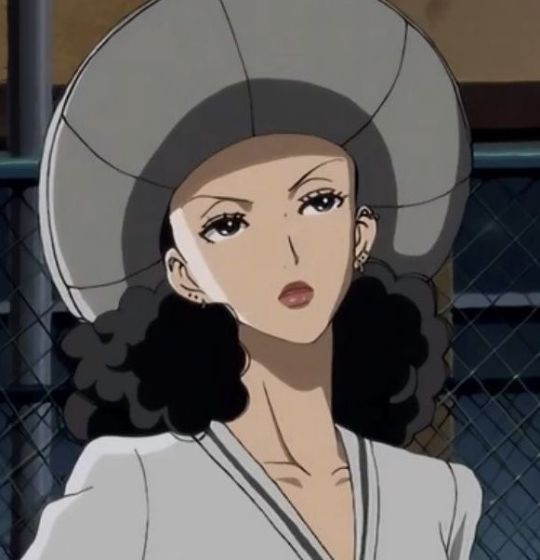
Junko is without a doubt a rather polarising figure within the Nana fandom. While some are inclined to view her as the epitome of a terrible friend, others find that there are aspects of her character that are not completely unreasonable. Some even argue that she is fully justified in her actions, interpreting them as a weary response to Nana Komatsu (Hachi’s) dependent and at times childish behaviour.
I personally find her to be an extremely intriguing case study on female friendships - it is rare to find a depiction of female friendships that deviates from the endlessly supportive, forgiving, and nurturing portrayals of female relationships. Often times women are not as forgiving and sweet to each other as is often idealised in popular media, with dynamics often being fraught with internalised misogyny, societal perceptions, past experiences, and unhealthy attachment - so it is refreshing to see such a realistic, unorthodox, and complex portrayal of relationships dynamics between women—an topic that is often underrepresented and undervalued, yet crucial in order for people of any age to reflect on their own friendships and the factors that shape their beliefs and behaviours within them.
Firstly, I think that there is no point in disputing that Junko, in her own, often unconventional way, cares about Hachi. Throughout the early episodes and chapters of Nana, Junko frequently steps in to protect and comfort Hachi when she thinks the situation calls for it. This can be seen when she immediately leaps into action when Hachi breaks down in tears, drunk and distraught over memories of Asano in Episode 2, calming her down. This concern is seen again when Junko berates Shoji for hurting Hachi’s feelings and leaving Hachi alone in an unfamiliar place before rushing out to go find her. When Junko learns that Hachi plans to move in with Nana Osaki, who was practically a stranger at the time, she tries to convince (scare) Hachi into reconsidering the decision, concerned with how Hachi would manage and what kind of person Nana would turn out to be. Accepting defeat when Hachi stayed steadfast in her decision, she challenged (Hachi’s words) Yasu, trying to support Hachi by passive aggressively asserting Hachi’s right to the apartment when Hachi failed to do so to her standards.
Infantilisation and stifling growth
However, Junko’s protectiveness often crosses the line into infantilisation, an action which is a mixture of both care for Hachi and an unconscious subscription to societal perceptions of ‘femininity’, which ends up doing more harm than good.
Ai Yazawa makes a point of emphasising that Junko has known Hachi for a long time - she is familiar with her romantic struggles and emotionally dependent tendencies. But Yazawa also shows us from the start as well that Junko is immalleable. She is a character that does not bend to displays of emotion or whims - a foil to Hachi’s very passionate and dreamy personality. It becomes apparent from their interactions that Junko, after having been around Hachi a long time, internalised how Hachi behaves and acts to the point where she sees these traits as innate to Hachi as opposed to behaviours that have developed and formed over time. This strongly held perception of Hachi becomes a problem, as instead of encouraging growth ( which is what every healthy friendship accepts and promotes), Junko reinforces these observed traits, often treating Hachi as if she were a younger sibling or even a child. She seems “relieved” when someone else is there to “take care” of Hachi and even makes decisions on her behalf, such as revealing Hachi’s crush on Shoji despite Hachi making a conscious decision to not be romantically involved in anyone, assuming that Hachi does not have the scope to actually achieve the emotional goals she sets for herself.
This dynamic consequently stifles and hinders Hachi’s ability to grow as an independent person throughout the anime, as Junko continues to see her through the lens of their shared past rather than as a peer. Even when Junko chastises Hachi for her lack of independence, she paradoxically expresses relief when someone else can ‘step in’ to care for her. This cycle of infantilisation keeps Hachi trapped in a dependent role within her friendships, and Junko’s inability to adjust her perception only reinforces these traits in Hachi. How people around you perceive and treat you influence how you subconsciously view yourself, and in Hachi’s case, she would see herself through Junko’s eyes as exasperating and hopelessly dependent. While Junko could very well believe her treatment stems from a deep and intimate understanding of Hachi, she in fact implies, most likely unintentionally, that Hachi is not capable of better. Junko's habit of infantilising Hachi repeatedly yet chastising her for the very thing Junko validates puts her in an endless pattern of being enabled, but not giving the genuine support when she does attempt to break the cycle.
Internalised misogyny and and complicity to the status quo
At the root of Junko’s behaviour there is a subtle form of internalised misogyny that permeates throughout her interactions with Hachi. Hachi’s personality is characterised by dreaminess, emotionality, and dependence, and aligns with traditionally "feminine" traits that patriarchal societies often devalue. She is romantic, frivolous and dependent, and Junko, in contrast, is portrayed to be and see herself as more pragmatic and career-oriented, which she is shown to be aware of and even proud of in the anime and manga. She firmly corrects Hachi when Hachi hopes she will give up on her dreams of art school in Tokyo, and pursues her passions and career with dedication throughout the anime. Her more modern lifestyle ( living unmarried with her boyfriend and striving for her dream career) contrast heavily with her more conservative mindset with gender - through interactions between Hachi and Junko, we can see that she seems to have adopted a more ‘masculine’ role between the two of them, acting as the voice of reason and logic, traits which are stereotypically associated with masculinity ( haha). You can see that this patriarchal compartmentalisation of personality traits is something that Junko had internalised growing up through her interactions with Hachi, perceiving Hachi as hopeless and in need due to her personality, when in actuality we find out later that Hachi is perfectly capable of making decisions herself, and managing difficulty by herself (with more resilience that others can muster). While she surely does not always make the best options, she is able to adapt and persevere - not exactly the actions of a hopelessly dependent person.
This is a greatly nuanced decision on Yazawa’s front, as she perfectly depicts how growing up in a patriarchal society does not only influence male and female relations, but all - due to Junko growing up in a patriarchal society where women with ‘feminine’ traits are simultaneously taken care of and condescended, she too mimics and appropriates such beliefs and actions. The status quo in such societies ( like Japan in the time the manga is set) are rigidly upheld yet at the same time result in the mocking and contempt of women who adhere to or fit the mould shaped and maintained by the same people who patronise them - and often times women are complicit in upholding harmful patriarchal ideals. I think this is a refreshing (and depressingly realistic) depiction of relationships between women, as it perfectly captures the delicate and painful cognitive dissonance between caring for someone and not doing what is in their best interest due to internalised misogyny.
A large aspect of internalised misogyny is putting male approval and attention on a pedestal, and Junko depicts such influences as well when she compares her love life to Hachi’s. She flaunts her alleged ability to form platonic male friendships without becoming romantically involved, ironically right before quickly entering into a relationship with Kyosuke. Junko then feels the need to justify her own quick decision of sleeping with and getting with Kyosuke to Hachi, showing a unconscious adherence to the notion that as a woman, getting with or attached to a relatively unknown man simply because of a desire to is a disdainful trait, and one that Junko makes a conscious effort to differentiate herself from - and not for Hachi. Hachi did not judge or even understand why Junko made such a fuss explaining; Junko’s attempts were more a form of self reassurance that she is not like the ‘others’ who are deemed undesirable and whorish ( a belief she holds due to her close interaction with patriarchy growing up). Junko is in fact not so different from Hachi, from what we can see from her actions in the anime and manga. We are told by her she does not attach herself romantically to men quickly, yet in the first instance possible we see otherwise. We see her look down on Hachi’s air-headed desire for a stereotypical, domestic relationship with a reliable man, while staying with Kyosuke throughout all the anime and manga, using him as a mode of support and guidance as well as a romantic and seemingly life partner. Her contempt of Hachi at times seems to be a reflection of her own insecurities with the aspects of her personality that do not fit the mould she wants - the aspects of her personality she was raised to see as less valuable and worthy and therefore grew up and internalised.
Junko’s internalised misogyny is also apparent in her loyalty to the men in her life, particularly in her defence of Shoji after he cheats on Hachi. Instead of holding Shoji accountable, Junko places the blame on Hachi, telling her that it was her fault for being too dependent, too self absorbed - too absent ( the very traits she was telling Hachi to adopt). This reaction reflects Junko’s struggle to justify her friendship with Shoji through her own internalised belief that women are responsible for men’s behaviour ( a common belief in patriarchal societies to take accountability away from men, instead vindicating and blaming the women involved). This scene serves to reveal Junko’s desire to preserve her own relationships and avoid conflict with male peers - by justifying Shoji’s actions, she maintains the comfort and security of her social circle, which includes her boyfriend Kyosuke, who is also Shoji’s best friend ( again rather similar to Hachi and her want of companionship) - she puts her male centred relationships on a pedestal at the expense of her female friendships and Hachi’s wellbeing.
Junko’s character serves as a window into the nuanced ways internalised misogyny, perception, and shared history can influence female friendships. Her dynamic with Hachi is shaped by her rigid perception of Hachi’s weaknesses and her own internalised biases about what traits are "acceptable" in women. While Junko is portrayed as a capable, independent woman—someone Hachi and other women can in some ways even looks up to—her patronising attitude ultimately undermines the potential of their relationship. Junko’s failure to see Hachi as an evolving, autonomous person perpetuates a cycle of dependence, preventing both women from growing as individuals and as friends, with Junko feeling equally responsible and burdened by Hachi but not allowing the relationship to develop beyond how it was in the past.
By portraying Junko, one of Hachi’s closest friends, as such a complex, multidimensional character, Ai Yazawa offers a compelling critique of the ways in which societal norms and internalised beliefs can distort relationships between women, and bring attention to topic that is often neglected yet experienced and lived by women universally. Junko’s story illustrates that it is not only overt sexism that influences women’s lives but also the more subtle, internalised forms of misogyny that shape how women perceive themselves and each other, and the pitfalls of relationships that remain stagnant in the past instead of allowing both parties to grow and flourish.
#nana osaki#manga nana#nana komatsu#nana anime#nana#nana and hachi#anime analysis#anime#anime and manga#manga analysis#manga#nana manga#nana hachi#hachi#hachiko#ai yazawa#ren honjo#takumi#junko saotome#media analysis#media literacy#character analysis#anime gif
265 notes
·
View notes
Text
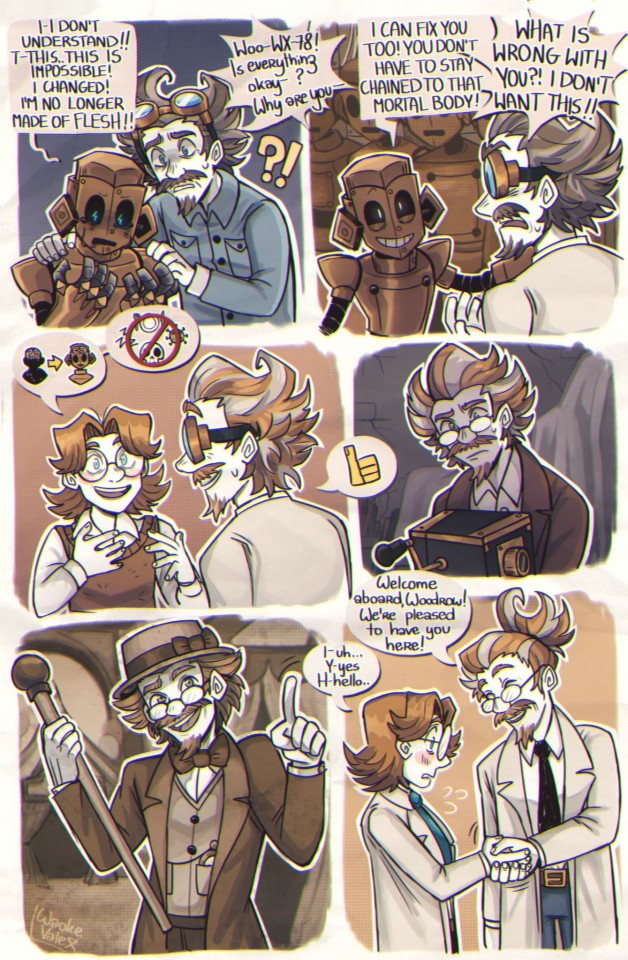
[For the record, WX-78's relationship with Wagstaff portrayed here is strictly PLATONIC and bordering familial. The similarities of their appearances are intentional]
I swear to God if people focus strictly on Woodrow again while trying to ignore Wagstaff's existence—
Ik people hate him and I'm tired of it, he's just a guy, it's not funny when you're doing it for so long. Max, while under the influence of them did a lot of worse things, and while I don't hate him for it, there definitely feels to be a double standard.
Y'know actually, it's kinda hilarious that whenever people come in contact with nightmare fuel or shadow creatures, they turn into the worst versions of themselves; Ie. William becoming Maxwell, inadvertently ruining Charlie's life, getting her killed and starting a kidnapping spree, trying to take someone like Witherstone straight up out of spite and personal grudges.
Willow burning down the Orphanage and seemingly appearing to show no remorse or internal conflict afterwards (whether there were other kids or not– but let's be honest, realistically she wouldn't have been the only kid in there).
Wagstaff genuinely trying to help people (while also taking secret payment from them, because while they are rich, he's seemingly broke, seeing his apartment and junk.) but he still goes out of his way to save their lives, until he stumbles upon the projector which is filled to the brim with nightmare fuel– I think you get the point. You could easily assume that humans getting in contact with this substance tend to become more callous of the others' general well-being.
Aside from that, it's fun to portray how Wagstaff's and Woodrow's relationship used to be. I always thought Woodrow used to highly admire Wagstaff and think of him as a mentor or father figure of sorts, while Wagstaff definitely was impressed with their skills, and who knows, maybe even cared about them somewhat as well.
People tend to villify Wagstaff while making WX appear blameless and an innocent victim, which is strictly false. I LOVE WX, but they are screwed up and evil, that is no act. I wanted to highlight this aspect of them here, they appear to have good intentions, but they don't care about what his needs and wants are here. They're trying to appear noble by wanting to save him from his awful flesh, but in reality, as soon as he begins doubting them and claims their project is hazardous and needs to be nullified, they immediately turn their back on him and attack him. Of course their plan fails and they end up in the Constant, bearing spite and resentment towards him, as well as a lot of internalized contlict. They don't fully hate him, because to an extent, they were the one who took things too far.
In a way, both of them appear to share the trait of : If it doesn't work, get rid of it and start anew, and whilst this mentality mostly applies for organic creatures in WX-78's case, Wagstaff is more double-sided.
No, but I genuinely love this old man and want to explore his lore, why he is as fucked up as he is, because he's a very interesting and fleshed out character!
#dst#dont starve#don't starve together#dst wagstaff#dst wx78#dst fanart#digital art#familial shit#got that#stop all the wagstaff hate
229 notes
·
View notes
Note
Are the omens and hornsent the same?
short answer: no
so to explain why the omen and the hornsent are different, we first have to understand what it means to be hornsent… the hornsent aren’t a species, they’re a civilization of humans defined by the horns that grow on their bodies:
“Hornsent view the Crucible as sacred for the refinement wrought through its evolutionary gifts. Most prominently, their tangled horns.”
“Horns are sublime artifacts to hornsent, and their presence confirms the belief that they are a chosen people. Only the repeated sprouting of fresh horns can create a tangled horn, which is viewed as an irrefutable symbol of primacy.”
“The Crucible has a particularly strong influence on the beasts of the realm of shadow, causing many to grow horns despite the characteristics of their species.”
the hornsent sprout horns because the Crucible has a strong presence in the land of shadow and causes horns to sprout on creatures who don’t normally have horns… the hornsent, who revere the Crucible and its “spiral current,” saw this as a blessing and as proof that they were “a chosen people,” so they cultivated this trait. in hornsent society, the larger and more tangled your horns are, the more awesome and cool and holy you are. this is why Jori, the leader of the theocratic hornsent inquisition, has the largest, most tangled horns of all:
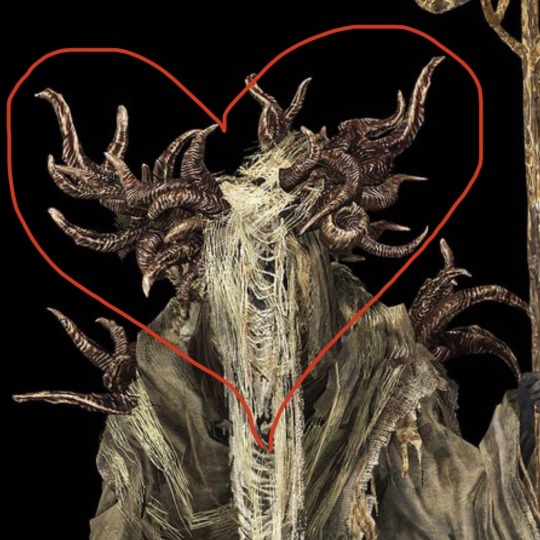
however, hornsent can also be born with no horns at all. this means that they'd be seen as sad and cringe. you can find hornless hornsent bound in chains, which means they might have even been a sort of slave caste... which, given what their society is like, wouldn't surprise me if that were the case:

(source: Zullie the Witch)
the omen, on paper, are the same as the hornsent — humans who were influenced by the Crucible, which caused horns to grow on their bodies. but the reason why they aren’t actually the same is because simply having horns doesn't make you hornsent. again, the hornsent are not a species, and “hornsent” isn’t a generic term for people with horns… the hornsent are a culture, a culture which the omen were very much not born into! unlike the hornsent, the omen were born into a society that sees their horns as impurities:
"A vestige of the crucible of primordial life. Born partially of devolution, it was considered a signifier of the divine in ancient times, but is now increasingly disdained as an impurity as civilization has advanced."
traits associated with the Crucible, including horns, became less and less accepted under the Golden Order as time went on... basically, the omen were seen as impure and unclean, unfit for the Erdtree's grace and excluded from society.
but there's actually something else that makes the omen fundamentally different from the hornsent... they're referred to as having "accursed blood"?
"Warped blade of shifting hue used by Morgott, the Omen King. The accursed blood that Morgott recanted and sealed away reformed into this blade."
"The mother of truth craves wounds. When Mohg stood before her, deep underground, his accursed blood erupted with fire, and he was besotted with the defilement that he was born into."
"Trident of Mohg, Lord of Blood. A sacred spear that will come to symbolize his dynasty. As well as serving as a weapon, it is an instrument of communion with an outer god who bestows power upon accursed blood."
it seems that there is something inherently different about omen blood that doesn't seem to be the case with the hornsent? omen can also innately produce a black-brown flame, which we never see any hornsent enemies do (pretty sure the inquisitors' fire is just normal fire from their candles). INTERESTINGLY, there's two items from the base game, the Omen Bairn and the Regal Omen Bairn, that produce these brown-flame wraiths... but a similar item from the DLC, the Horned Bairn, produces "vengeful spirits" that are pale and colorless!!





it's almost like the wraiths produced by the omen are "unclean" compared to the hornsent ones!
so I think this pretty definitively proves there's something more going on with the omen? but why is this the case?? Dung Eater's ending makes me think that the omen might be "cursed" simply because their existence is incompatible with the Order under the Erdtree...

"Curse grown on a corpse killed and defiled by the Dung Eater. A tender pox afflicted with omen horns. The Dung Eater cultivates the seedbed curse on corpses. By doing so he prevents dead souls returning to the Erdtree, leaving them forever cursed."
"Loathsome rune gestated by the Dung Eater. Used to restore the fractured Elden Ring when brandished by the Elden Lord. The reviled curse will last eternally, and the world's children, grandchildren, and every generation hence, will be its pustules. If Order is defiled entirely, defilement is defilement no more, and for every curse, a cursed blessing."
but there's also the theory that the omen curse was actually created by the dying hornsent as revenge upon their attackers... Hornsent Grandam says this when attacked:
"A curse upon thee, rotten miscreant. A curse upon the strumpet's progeny, upon Marika's children each and all. The curse of the omen shall strike thee down... In the form of the sacred beast's ire. May the curse strike thee… To the very last..."
she specifically calls it the "curse of the omen!" the one thing that makes me question this theory though is that she also says "in the form of the sacred beast's ire," and we know the divine beast's ire takes the form of storms... nothing like anything the omen do. an interesting theory nonetheless!
anyway TL;DR, the hornsent and the omen are different because 1. the hornsent are a culture (not a generic name for horned people), and the omen were specifically born under the Erdtree's Order, and 2. the omen are tangibly "cursed," but the hornsent are not
#elden ring#hornsent#asks#morgott and mohg would've been extra cool and sexy if they had been born in hornsent society tho
185 notes
·
View notes
Text
Souls-like AU: What you need to know about The Puppetmaster!

Ah, Caine. The man, the... uh, silly guy with the weird teeth head.
First things first, Caine is NOT an AI, despite claiming himself to be one when he introduces himself to Pomni. He is a full-on human being, and was just as trapped as everyone else is (it's simply easier to claim he's the AI gamemaster, which is sorta half-true).
But... due to him being one of the creators of the Souls-like game, The true AI Gamemaster had chosen to take out it's anger by puppeteering Caine via it's strong influence.
Thus, becoming the mad Puppetmaster.
To ensure full control over him, the AI had Caine's empathy levels blocked, turning him into a whimsical but unpredictable sociopath who moreso cares about letting the players be a part of the game forever, rather than anything else that would be detrimental to player comfortability and fun meter.
Despite this however, the AI isn't actually mind-controlling Caine, It's processing powers could never take over an entire human brain no matter how much it tried; it is simply influencing his thought patterns, ideas and emotions to a much, MUCH darker level, as well as amplifying his traits down to the negatives like a parasite.
So in The Puppetmaster's isolation and desperation for interaction, he's chosen to keep players inside the game for as long as he wants.
The AI even talks to Caine openly sometimes (it comes in the form of the heartpiece blinking and glowing in a pattern), though usually when they're alone.
When this happens, it seems like Caine is simply on a "one-sided" conversation with the air that could easily come across as a madman's insane ramblings to any sane being that encounters him at that moment.
Now, what about Pomni?
She's his s/o in real life, how does he feel about her being present in the game?
Well, he strongly feels something, that's for sure. It constantly flickers between adoration (natural) and possessiveness (influenced), But to Pomni, he's just being one hella weird guy with no respect for personal space.
Still, due to his empathy levels being blocked, he can't help but feel nothing whenever Pomni dies from a boss. After all, it's just a quick snap with the fingers, and then she's back to life like no big deal. All good and dandy, right?
Who cares about the technicalities of death when you could bring someone back over, and over again?
What about Able?
Able's his good brother. Sure, there were times when Caine felt inferior compared to Able's intellectual talent, but Able always comforted Caine whenever that happened, and all would be fine between them.
Though now.... this tiny bit of inferiority complex has turned into full-blown jealousy and paranoia, thanks to the AI's influence.
This was a major factor in Able's imprisonment inside The Patriarch's body, which is a process that's usually dangerous (since the AI and the human consciousness could mix, coughcoughjustlikehim), if it weren't for the fact that Able had a way around the code to prevent it from completely mixing with him.
Able's case is special, since The Patriarch was already a part of the game before his arrival. Able's defiance against the Puppetmaster resulted in The Patriarch becoming Able's physical prison instead of a traditional "player-turned-boss" scenario, where the players' moveset, iconic traits and thought process become a template for their boss AI counterparts.
What about the "Face The Puppetmaster" ending?
Instead of cutting it's losses, the AI doubled down on it's efforts; taking on both Able and Pomni and further amplifying Caine's already massive jealousy and paranoia into a full-on anger breakdown over the "betrayal".
This ultimately leads to a fatal flaw that allows Pomni to strike the heartpiece when it's at it's lowest (from using all of it's processing power) and even deliver the finishing blow, which destroys the gamemaster completely with the help of Able completely removing the AI itself from the game.
Thus, freeing Caine from the strings of the Puppetmaster persona.
#tadc#tadc au#the amazing digital circus#tadc harlequin au#the amazing digital souls like#the amazing digital souls-like au#tadc souls-like au#pomni#caine#tadc able#caine x pomni#pomni x caine
365 notes
·
View notes
Text
ok so yk how felicias hair is purple and vi and jinxs hair is pink and blue, and their father seems to have brown hair. well colored hair seems to be one of the dominant traits of their haircolor pool, and as all haircolor is, this is a polygenic gene pool. now felicia seems to have a codominant gene with one allele for pink and one allele for blue, like this:
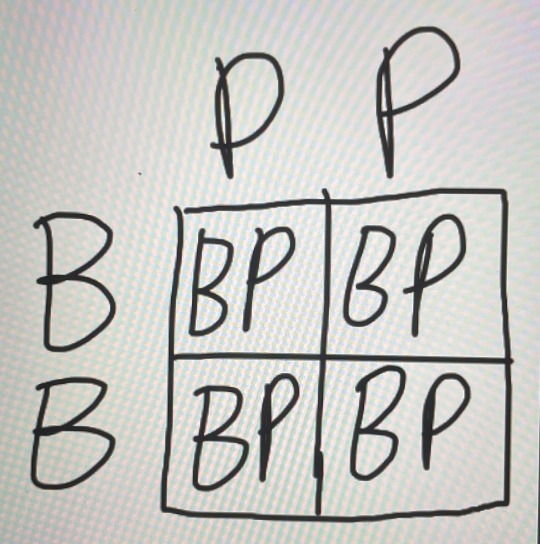
like a wildflower.
this:
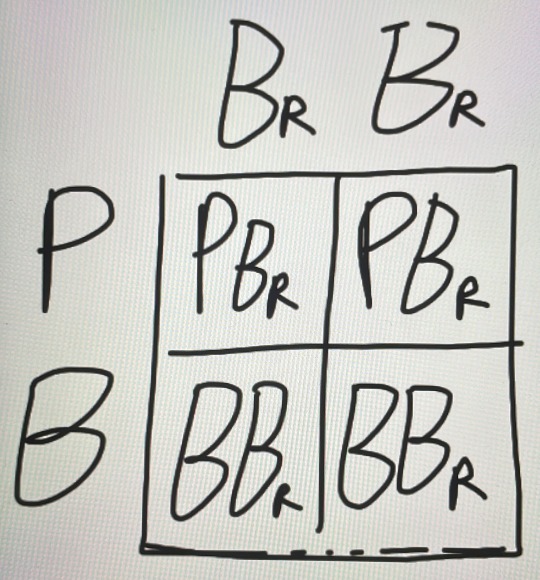
would be the chart for vi and jinx's genes, PB being felicia (pink and blue) and BrBr being their father (brown, which is still a dominant trait, but yields to these other colors). when you chart it the genes exhibit that pink is dominant over brown and blue is dominant over brown, (and it doesnt matter what the fathers genes were, as in if he was carrying a recessive gene, it would still get overpowered by pink/blue)
there was always a 50% chance their child would have blue hair and a 50% chance their child would have pink hair
so clearly felicia has dominant traits, as hers are easily seen within both her daughters, although we dont see much of their father (like one drawing) and their physical appearances are very influenced by their environments (as we see in the happy au, with powder's skin being much healthier and not as sickly as jinx's)
this is also shown in the kirammans as caitlyn and her father both have dark blue hair and her mother has brown, greying hair, blue is either dominant or her mother carries a recessive blue allele.
i would be able to provide more examples but we dont see many peoples parents in this show. it is curious how "colored" hair (at least pink and blue) must be dominant even though there are less people with these traits, like straight hair vs curly hair, curly is dominant but not as common.
honestly the arcane genes are extremely fascinating and if i knew more that would be fabulous
#apologies if im wrong in some of these areas#im not a biologist#just a kid with an interest whos been taking extra science classes at higher levels for 7 years#but its intrigued me since i finished the show#and now that im finished with biology class#i actually have time to think about biology and science apart from my class that was torture#but honestly whats yalls opinion#louis is insane#vi arcane#vi and jinx#vi and powder#jinx arcane#arcane#arcane s2#arcane season 2#arcane spoilers#felicia arcane#arcane felicia#caitlyn kiramman#caitlyn arcane#caitvi#caitlyn#arcane text#violet
103 notes
·
View notes
Text







Finished growth stage chart with Lewk, Asta and Milo! The older designs are just for fun, the kids are going to remain the ages they're currently at, though I'm not ruling out potential "what if" drawings with those designs
(More details below the cut)
The pups hatch from eggs with their eyes closed, which open over the course of a week. At around 2 months, they're able to crawl around and even walk on all fours, though they are very clumsy. At this age, they can't speak and communicate mainly through meow-like sounds, though over time they begin trying to repeat the word 'papa'. At 6 months, they're able to walk on two legs (still using their arms as support) and can communicate in very simple sentences. Between 2 and 3 years old they attend school for the first time, showing more interest in building relationships with their peers as well as their interests. They're able to run and jump on two legs, as well as form more complex sentences and hold conversations. Their teenage years are when their adult shapes and heights begin to form, and aside from continuing their education, they can start very simple jobs. Afterwards, their physical aging slows down, until it stops at around 20 years old.
(In order from left to right)
Milo
Milo hatched about a week after he was supposed to, from a much smaller egg than his twin sister or his older brother. It was clear that he did not receive as much nutrition as his siblings during development stages, resulting in the additional time he needed inside his egg. Because of that, he was quite a bit smaller than expected from his first days, which continues to be a pattern as he grows into adulthood. He hatched nearly hairless, with the exception of his tail and back legs. Over the next months, his fur grew, though only on his lower body and head, leaving his upper body hairless and vulnerable to cold. As he progresses through the growth stages, his struggle to keep up with his peers will become apparent, and he'll remain much shorter than Asta and Lewk even in adulthood. Appearance-wise, he takes a lot after Grimm, mainly his headshape and the overall body plan, though he inherited leucism (and an extra pair of arms) from Vyrm. In fact, his development as a runt of his litter is a parallel to Vyrm's childhood, though luckily for Milo he was born into a much more loving family.
---
Asta
Asta's egg was a bit smaller than Lewk's (due to the lack of space inside Grimm's womb that she shared with Milo), though she quickly caught up in size with him. Unlike her twin brother, Milo, she hatched with short fur all over her body. By the time Milo left his egg, Asta's eyes were already open, putting her ahead of him development-wise from the early childhood. In just a few years it became clear that she would end up much taller than her twin brother, and as she continues to age, the gap between her and Milo will only grow wider and wider. In her adult design, she will be very tall, about the same height as Grimm, and very muscular, giving her a very intimidating silhouette. When it comes to appearance, she takes the most after Grimm, most notably his height and fur color (though the brown elements are a result of wyrm genes, as they are naturally brown in color, a trait Vyrm lacks due to his leucism). The only clear resemblance to her other parent is the eye color, and the presence of extra arms.
---
Lewk
The first child of Vyrm and Grimm born nearly two years before the twins, Lewk surprised them once he hatched, as he possessed wings, a trait not visible on either of them. In reality, Grimm seemingly still carries the trait genes of his previous forms, which may manifest in his offspring like they did with Lewk. Similarly to Asta, Lewk hatched covered in short fur, with a surprisingly fluffy tail for a newborn. His fur continued to grow in a quite distinct pattern, and a light color influenced by the leucism he inherited from Vyrm. As the years pass, he will gain a lot more body mass, manifesting in extra fat around his belly similar to Vyrm. In general, his adult silhouette will be fairly wide and stocky, with muscular arms and legs. This means that he is the most Vyrm-like of the children, with a very similar headshape, torso and legs which are a lot shorter in proportion than Grimm's. The most distinct Grimm trait, aside from the wings, is a slightly longer snout and very unique looking eyes (which, anatomy wise, are actually quite close to Vyrm's)
141 notes
·
View notes
Text
I think the thing people forget is that Mike and El didn't know each other for long before they got their little crush for each other
they met, got a crush because the other one was a good person to be around and they were curious about each other and kissed and all in one week
then El has to stay away for one year and can only spy on him for that time so she gets to see him and his thoughts a lot and get to know him better and her crush grows to obsession
but listening to someone like they're on a podcast is not the same thing as interaction with them face to face, they don't really know each other by the end of season 2
and especially Mike doesn't know El, he just idealized her
also El herself hadn't even had time to know herself well during s1 because of how she grew up, she didn't know what she liked/disliked, what friends were, what some type of food was...
she was already a good, kind and brave kid but she had to "form" her character traits in a more personal way
when they get back together at the end of season 2 they like each other like you can like someone that you find pretty and also that you think are a cool person because they've been good to you / helped you
then in season 3 they start actually dating and we find out the majority of the time they just love to make out with each other so much to the point that Hopper gets upset about it because he sees that that's not looking like a healthy relationship for their age, kids in actual working long lasting relationships would be more outside having fun than closed in the house kissing, only the ones that have more physical chemistry than anything else want to only do that the majority of the time
then the writers also showed us little moments where we can see that:
They don't like the same songs, don't have explicit common interests except wanting to kiss and... Make fun of Hopper? 😂
Mike doesn't feel safe telling her about Hopper/still feels awkward with her about his own feelings
El was relying on Mike so much that she didn't even took the chance to really be friends with the only other girl in the group until he flaked on her
El and Max had much more fun than Mike and El and also the writers focused on making it clear that El needed to detach from Mike's influence and Hopper's too and get her own ideas about stuff and all and El's character started to shine more
Then season 3 ends with her regressing because she loses Hopper, she needed to be around someone "familiar" after that and getting back with Mike was what provided that for her
Then she starts being part of the Byers family so she got more support around her but she's also being bullied and I suspect she knows Mike idealized her so she started to feel too insecure about herself to actually open up to Mike about it and risk that him seeing her be weak is what made him not love her
In her mind Mike's presence in her life as a boyfriend but even as just a friend (which is what she really wants imo) becomes conditional to him thinking she's cool and not a monster and she starts lying
Meanwhile Mike is going more or less through the same thing because he thinks he's a freak nerd and a nobody compared to El and she will dump him soon so he starts closing off (he never really opened up to her because of his insecurities and also because they are not truly in love)
Then Lenora happens and all of this comes to the surface... In Lenora the writers do the same thing they started to do in season 3 showing us that:
El and Mike don't like the same food (milkshake, pineapple on pizza, burrito for breakfast)
El and Mike dress up to look cooler than they are and present a facade to the other instead of trusting that they will be accepted as they are
El doesn't seek comfort in Mike often, Mike is not good in providing comfort
Mike doesn't inherently feel the need to reassure her about his feelings for her because his fear/insecurity is stronger than his love for her
El and Mike are okay with lying to each other as long as this helps them keep the other in their lives or makes the other think they are cooler than they are
El is okay with leaving Mike behind and not involving him as her partner
Like it's pretty clear this relationship is not gonna last... I think they do love each other SO SO SO MUCH but not in a way that you can call "true love" in the romantic sense
They want the other in their lives forever and I'm sure of that, they do have love for the other, they think the other is a great person with a good heart and they did have a crush/like each other physically in my opinion (and that's why they stayed together this long) but they just are not in love, the writers have not showed me they are in love they have just made the characters say it (I think they do even think they're saying the truth when they aren't) without backing it up by the narrative they presented around them
180 notes
·
View notes
Text
Hazbin Hotel Sketchbook 2: Part 2
Masterpost
Morningstars
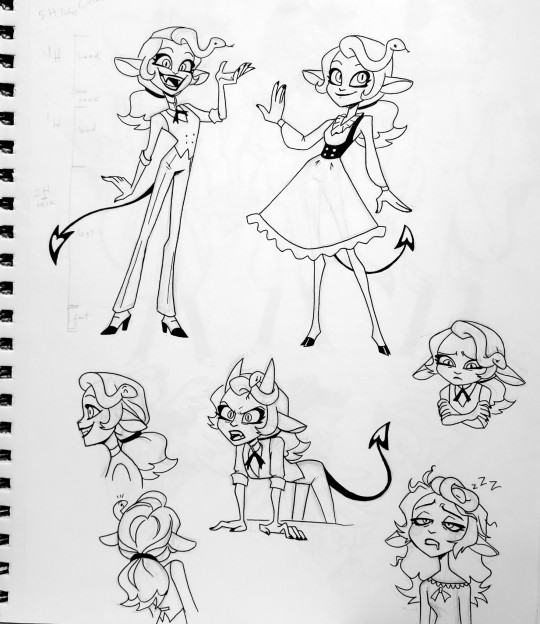
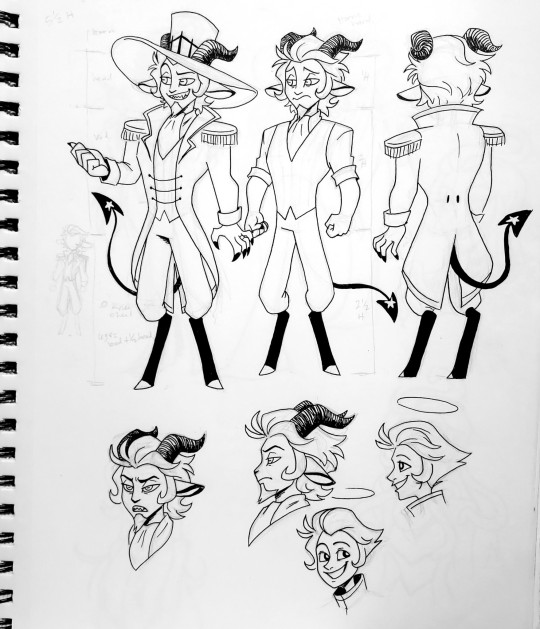
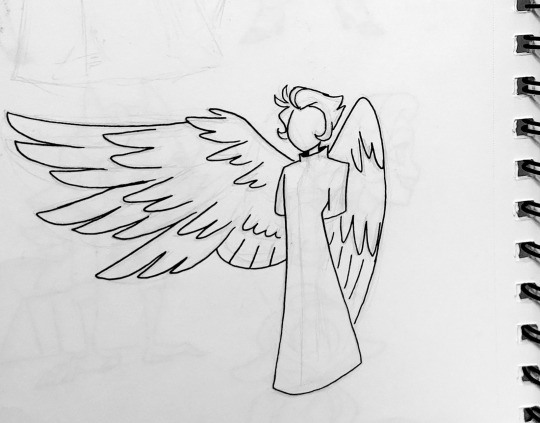
I will have some design notes under the cut, so stay tuned.
Charlie and Lilith's snakes are all named.
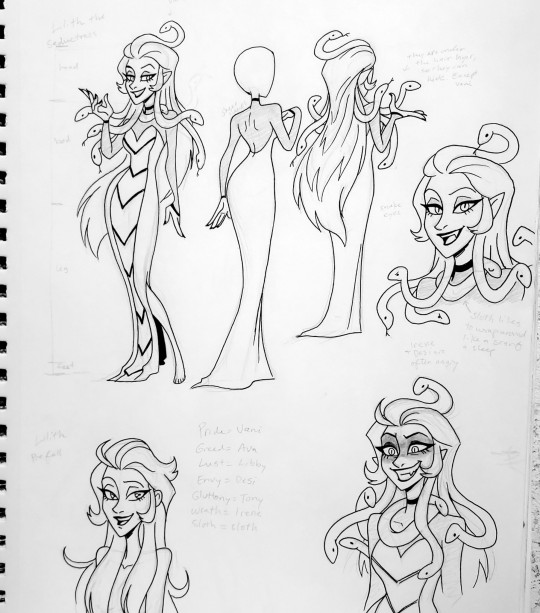
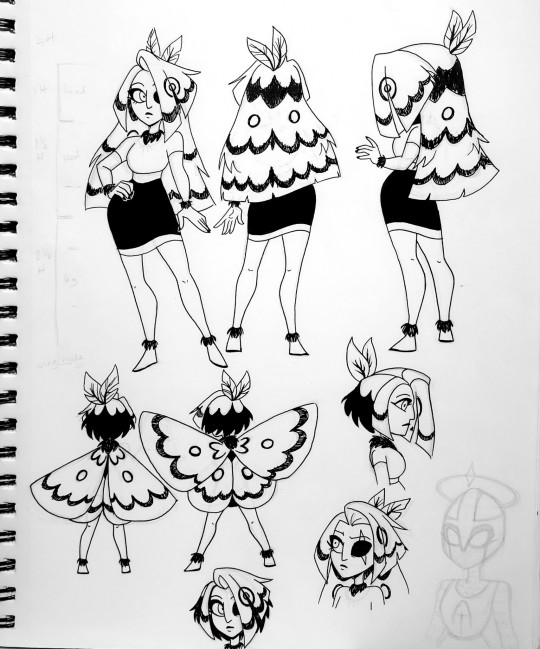
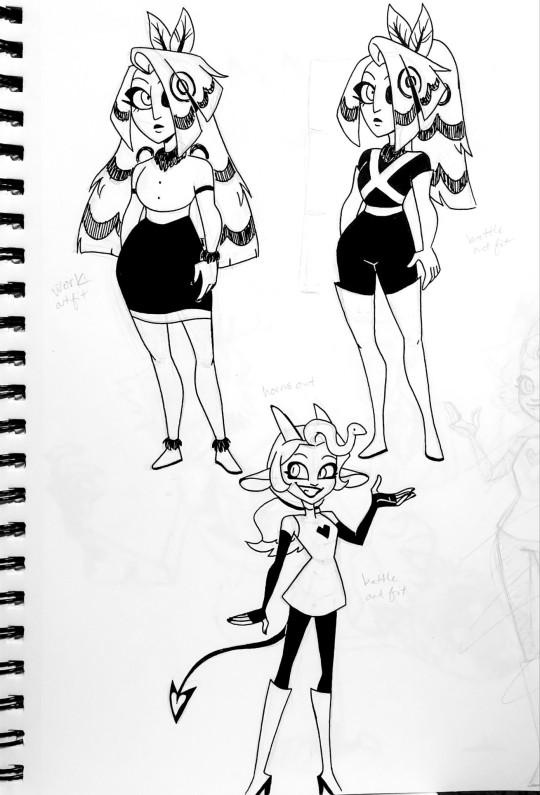
Notes under the cut to minimize clutter. I'll try to keep it brief since I've talked about a lot of this before, and plan to go into more detail in dedicated character posts later.
Between dolls, snakes, apples, circuses, ducks, etc, there were just too many motifs/thematic elements to shove onto just Lucifer. So, I streamlined and distributed. Lucifer is goat themed, Lilith is snake themed. Charlie is a mix of the two. I also use this to partly to imply that "the Devil" is not solely Lucifer. But humans mistake various different demons as one character.
Charlie:
Her goat traits were inherited from Lucifer. Hooves, ears, etc. Also the tail. Her hair is designed to look like a goat tail.
Snake traits were inherited from Lilith. Vertically slitted eyes, hair snake, etc. Also doll cheeks and pale skin.
I had considered having her hair be totally made of snakes like Medusa, but that seemed annoying to draw, so I just did one. His name is Hugh, short for Hubris, which is a synonym for pride.
Lucifer:
He has far too many motifs in general. He needed streamlining.
Apples- I reduced this because I think it would be more fitting for Adam and Eve. Eve as the first to eat the fruit, and Adam because... Adam's apple, I guess.
Doll- I know Charlie is meant to resemble a porcelain doll. And in-universe gets it from her dad. But I don't really understand why, so I took it away from him and gave it to Lilith.
King- He does not have any real authority. It's a prison, and even Lucifer is caged. Nobody bothers to respect him. So the "crown" on his hat resembles a gate or cell bars
Ducks- I never understood the choice to associate Lucifer with ducks. And thematically, I can't really justify it. So...um... sorry, but no rubber duckies.
Goat- From what I understand, goats as a demonic symbol comes more from pagan influences rather than the Bible. Overall, Lucifer is a goat because he's been assigned the blame for all the evil in the world. He's the scapegoat. Placing sin on Scapegoats was a Jewish practice during Yom Kipper.
Lightbringer- the word lucifer is used once in some translations of the Bible to describe the arrogance of the King of Babylon in the book of Isaiah, but not as a name. Instead of directly translating the Hebrew word that meant "light bringer," "morning star," "dawn bringer," or "shining one," the Latin term was used. Lucifer often referred to the "star" that is the planet we now call Venus. It would be used to represent pride because it rose and fell before the sun. So the instance of lucifer in the Bible isn't even used as a name, and didn't even refer to the Devil. I say all this because I think it fits the scapegoat theme, and it's why I put a star on his tail.
Wings- Seraphim are described as having 3 sets of wings. Rather than deal with all that or even try to figure out the anatomy of that, I just gave them three sets of primary feathers, which sort of imitates the 6-winged look but is easier for me to draw.
Speaking of his wings. He lost them when he fell. So he does not have wings at all anymore. If he did, they'd be more like dragon wings.
Lilith:
Lilith is not a biblical figure. The word lilith was used once in just some English translations of the Bible. And it's referring to a type of demon, and not used as a name. Other translations change the term to shriek-hawk or similar terms, and is listed with various other night creatures. Lilith as a character appeared in Jewish lore, and was likely satirical. But away from theology and onto hazbin lore...
Because Lilith was originally created as a wife for Adam, she felt treated like an object or plaything rather than a person. So when she fell, she picked up a little bit of a doll motif that isn't prominent in these drawings. I essentially traded the doll features instead of horns. I'm still workshopping specifics.
She was just as involved(if not more so) with offering the fruit to Eve. Thus, she gets the motif of the snake. I didn't want to make her hair entirely snakes, because the long flowing hair seemed like a prominent design feature for her. So I opted to give her 7 hair snakes, one to represent each deadly sin/ring of hell. They're all named.
Pride= Vani (Vanity), she's the one on the top of her head.
Greed= Ava (Avarice)
Lust= Libby (Libido)
Envy= Desi (Desire)
Gluttony= Tony
Wrath= Irene (Ire/Irate)
Sloth= Sloth (too lazy for an actual name). He's the one coiled around her neck, usually sleeping. He also comes from the left side of her head.
Vaggie:
I leaned into the moth elements in her design. I think it was the Condalia Silk moth that I used as as my main reference.
When she fell, she was transformed into a demon like everyone else. So she isn't really an angel anymore and bleeds the same as the other sinners. Not even Lucifer really counts as an angel anymore, due to the corrupting nature of hell.
When Vaggie regains her wings, they are no longer angel wings but are instead moth wings to match the rest of her. They actually double as her hair via magic logic because I like it that way, and it lets me reference some of her older designs.
#hazbin hotel#charlie morningstar#lucifer morningstar#lilith morningstar#vaggie#heavenbound au#a3 art#fanart#traditional art#sketches#sketchbook tour#sketchbook tour 2#hellaverse
82 notes
·
View notes